Linked Lists C Attaching a node inside the list Hello Im ha
Linked Lists (C++) - Attaching a node inside the list
Hello, I\'m having a problem figuring out my attach() function below, the third condition seems to de-link the rest of the list when adding a node in the middle of the list, or adding it after the first node in the list.
In the client test program, we have a list of values
[10] -> [20] -> [30]
I\'m trying to make my function work so that if we set the cursor to the headptr (10),
the list will look like [10]->[15]->[20]->[30], however what happens is [10]->[15]->NULL
How would I write my 3rd condition inside attach to ensure the rest of my list is not being de-linked when the cursor is set to the headptr or anywhere in the middle of the list?
Here\'s my code
sequenceClass.cpp
//
// sequenceClass.cpp
// assignment12.1
//
// Created by Brett Henderson on 11/16/16.
// Copyright © 2016 bretth18. All rights reserved.
//
#include \"sequenceClass.h\"
namespace cs_sequenceClass {
// constructor
sequence::sequence() {
numItems = 0;
cursor = NULL;
headPtr = NULL;
tailPtr = NULL;
precursor = NULL;
}
// copy constructor
sequence::sequence(const sequence& copy) {
copySequence(copy);
}
// deconstructor
sequence::~sequence() {
deleteSequence();
}
void sequence::deleteSequence() {
// start from top
node* tempcursor = headPtr;
if (tempcursor == NULL) {
return;
}
while(tempcursor != NULL) {
node* garbage = tempcursor;
tempcursor = tempcursor->next;
delete garbage;
}
numItems = 0;
}
void sequence::copySequence(const sequence& inputSeq) {
// temporary pointer has the inputseq header
node* tempptr = inputSeq.headPtr;
node* tempCurptr = inputSeq.cursor;
node* tempPreptr = inputSeq.precursor;
node* tempTailptr = inputSeq.tailPtr;
start();
// if temporary pointer is NULL
if(tempptr==NULL) {
headPtr = new node;
headPtr = tempptr;
cursor = new node;
cursor = tempCurptr;
precursor = new node;
precursor = tempPreptr;
tailPtr = new node;
tailPtr = tempTailptr;
} else {
// create new node
headPtr = new node;
// current pointer point to head
node* curptr = headPtr;
// copy temporary pointer data to current pointer
curptr->data = tempptr->data;
// set next pointer of current pointer to null
curptr->next=NULL;
// while temporary ponter is null
while(tempptr!=NULL) {
/* debug */
std::cout << \"WHILE LOOP IS BEING HIT\" << std::endl;
//create a new node and assign it tp current ponter
curptr->next=new node;
//Now the current pointer is next pointer
curptr=curptr->next;
//Assign data to the currentpointer
curptr->data = tempptr->data;
//Assign null to next
curptr->next=NULL;
// teemppttr points to next node
tempptr=tempptr->next;
}
}
}
void sequence::insert(const value_type& entry) {
numItems++;
node* tempptr = new node;
tempptr -> data = entry;
if (headPtr == NULL) { // inserting into empty list.
tempptr -> next = NULL; // precursor remains NULL.
headPtr = tempptr;
tailPtr = tempptr;
} else if (cursor == NULL || cursor == headPtr) { // inserting at front.
// tailptr and precursor don\'t change.
tempptr -> next = headPtr;
headPtr = tempptr;
} else { // inserting anywhere else.
tempptr -> next = cursor; // tailptr, headptr and precursor don\'t change.
precursor -> next = tempptr;
}
cursor = tempptr;
}
void sequence::attach(const value_type& entry) {
numItems++;
node* tempptr = new node;
tempptr -> data = entry;
// empty sequence
if (headPtr == NULL) {
std::cout << \"ATTACH COND 1\" << std::endl;
tempptr->next = NULL;
headPtr = tempptr;
tailPtr = tempptr;
}
// no current item
else if (cursor == NULL) {
std::cout << \"ATTACH COND 2\" << std::endl;
// insert @ end
tailPtr = tempptr;
} else {
std::cout << \"ATTACH COND 3\" << std::endl;
// inserted into sequence after current
precursor = cursor;
cursor -> next = tempptr;
// if item is the last in the sequence now
if (tailPtr == NULL) {
tailPtr = tempptr;
}
// debug();
}
cursor = tempptr;
// debug();
debug();
}
sequence::size_type sequence::size() const {
return numItems;
}
void sequence::start() {
// there is nothing in the sequence
if (headPtr == NULL) {
cursor = NULL;
} else {
// set cursor to first item in the sequence
cursor = headPtr;
}
}
void sequence::debug() {
node* tempptr = headPtr;
while (tempptr != NULL){
std::cout << \"SEQUENCE: \" << tempptr->data << std::endl;
tempptr = tempptr->next;
}
}
void sequence::advance() {
assert(is_item());
if (cursor == precursor) {
cursor = NULL;
} else {
precursor = cursor;
cursor = cursor->next;
}
}
sequence::value_type sequence::current() const {
// return cursor->data;
if (cursor->data == NULL) {
return NULL;
} else {
return cursor->data;
}
}
bool sequence::is_item() const {
return (cursor != NULL);
}
void sequence::remove_current() {
assert(is_item());
numItems--;
// todo: need more condition
if (is_item()) {
// set to temp
node* tempptr = cursor;
// delete cursor
delete tempptr;
// set cursor to next in line
cursor = tempptr->next;
}
}
sequence sequence::operator =(const sequence& right) {
if (this != &right) {
// deallocate & copy construct
deleteSequence();
copySequence(right);
}
return *this;
}
}
sequenceClass.h
//
// sequenceClass.hpp
// assignment12.1
//
// Created by Brett Henderson on 11/16/16.
// Copyright © 2016 bretth18. All rights reserved.
//
#ifndef sequenceClass_h
#define sequenceClass_h
#include <stdio.h>
#include <cstdlib>
#include <iostream>
#include <cassert>
namespace cs_sequenceClass {
class sequence {
typedef int value_type;
typedef std::size_t size_type;
private:
struct node {
value_type data;
node *next;
};
node *headPtr;
node *tailPtr;
node *cursor;
node *precursor;
public:
value_type numItems;
sequence(const sequence& copy);
void debug();
// deconstructor
~sequence();
sequence();
// postcondition: The sequence has been initialized to an empty sequence.
// helper function for copy constructor
void copySequence(const sequence& inputSeq);
void start();
// postcondition: The first item in the sequence becomes the current item (but if the
// sequence is empty, then there is no current item).
void advance();
// precondition: is_item() returns true
// Postcondition: If the current item was already the last item in the sequence, then there
// is no longer any current item. Otherwise, the new item is the item immediately after
// the original current item.
void insert(const value_type& entry);
// Postcondition: A new copy of entry has been inserted in the sequence before the
// current item. If there was no current item, then the new entry has been inserted at the
// front. In either case, the new item is now the current item of the sequence.
void attach(const value_type& entry);
// Postcondition: A new copy of entry has been inserted in the sequence after the current
// item. If there was no current item, then the new entry has been attached to the end of
// the sequence. In either case, the new item is now the current item of the sequence.
void remove_current();
// Precondition: is_item returns true.
// Postcondition: The current item has been removed from the sequence, and the
// item after this (if there is one) is now the new current item.
size_type size() const;
// Postcondition: Returns the number of items in the sequence.
bool is_item() const;
// Postcondition: A true return value indicates that there is a valid “current†item that
// may be retrieved by the current member function (listed below). A false return value
// indicates that there is no valid current item.
value_type current() const;
// Precondition: is_item() returns true
// Postcondition: The current item in the sequence is returned.
sequence operator =(const sequence& right);
void deleteSequence();
};
}
#endif /* sequenceClass_h */
main.cpp
// NOTE!!! You will need to change the \"using namespace daveharden_sequence;\" line to use your namespace instead!
// FILE: sequence_exam3.cxx
// Written by: Michael Main (main@colorado.edu) - Oct 31, 1997
// Non-interactive test program for the sequence class using a linked sequence
//
// DESCRIPTION:
// Each function of this program tests part of the sequence class, returning
// some number of points to indicate how much of the test was passed.
// A description and result of each test is printed to cout.
// Maximum number of points awarded by this program is determined by the
// constants POINTS[1], POINTS[2]...
#include <iostream> // Provides cout.
#include <cstdlib> // Provides size_t.
#include \"sequenceClass.h\" // Provides the sequence class with double items.
using namespace std;
/****************************************
CHANGE THIS LINE: */
using namespace cs_sequenceClass;
/****************************************/
// Descriptions and points for each of the tests:
const size_t MANY_TESTS = 6;
const int POINTS[MANY_TESTS+1] = {
18, // Total points for all tests.
4, // Test 1 points
4, // Test 2 points
4, // Test 3 points
2, // Test 4 points
2, // Test 5 points
2 // Test 6 points
};
const char DESCRIPTION[MANY_TESTS+1][256] = {
\"tests for sequence Class with a linked sequence\",
\"Testing insert, attach, and the constant member functions\",
\"Testing situations where the cursor goes off the sequence\",
\"Testing remove_current\",
\"Testing the copy constructor\",
\"Testing the assignment operator\",
\"Testing insert/attach for somewhat larger sequences\"
};
// **************************************************************************
// bool test_basic(const sequence& test, size_t s, bool has_cursor)
// Postcondition: A return value of true indicates:
// a. test.size() is s, and
// b. test.is_item() is has_cursor.
// Otherwise the return value is false.
// In either case, a description of the test result is printed to cout.
// **************************************************************************
bool test_basic(const sequence& test, size_t s, bool has_cursor)
{
bool answer;
cout << \"Testing that size() returns \" << s << \" ... \";
cout.flush( );
answer = (test.size( ) == s);
cout << (answer ? \"Passed.\" : \"Failed.\") << endl;
if (answer)
{
cout << \"Testing that is_item() returns \";
cout << (has_cursor ? \"true\" : \"false\") << \" ... \";
cout.flush( );
answer = (test.is_item( ) == has_cursor);
cout << (answer ? \"Passed.\" : \"Failed.\") << endl;
}
return answer;
}
// **************************************************************************
// bool test_items(sequence& test, size_t s, size_t i, double items[])
// The function determines if the test sequence has the correct items
// Precondition: The size of the items array is at least s.
// Postcondition: A return value of true indicates that test.current()
// is equal to items[i], and after test.advance() the result of
// test.current() is items[i+1], and so on through items[s-1].
// At this point, one more advance takes the cursor off the sequence.
// If any of this fails, the return value is false.
// NOTE: The test sequence has been changed by advancing its cursor.
// **************************************************************************
bool test_items(sequence& test, size_t s, size_t i, double items[])
{
bool answer = true;
cout << \"The cursor should be at item [\" << i << \"]\" << \" of the sequence\ \";
cout << \"(counting the first item as [0]). I will advance the cursor\ \";
cout << \"to the end of the sequence, checking that each item is correct...\";
cout.flush( );
while ((i < s) && test.is_item( ) && (test.current( ) == items[i]))
{
i++;
std::cout<< \"CURS: \" << test.current() << std::endl;
test.advance( );
}
if ((i != s) && !test.is_item( ))
{ // The test.is_item( ) function returns false too soon.
cout << \"\ Cursor fell off the sequence too soon.\" << endl;
answer = false;
}
else if (i != s)
{ // The test.current( ) function returned a wrong value.
cout << \"\ The item [\" << i << \"] should be \" << items[i] << \",\ \";
cout << \" but it was \" << test.current( ) << \" instead.\ \";
answer = false;
}
else if (test.is_item( ))
{ // The test.is_item( ) function returns true after moving off the sequence.
cout << \"\ The cursor was moved off the sequence,\";
cout << \" but is_item still returns true.\" << endl;
answer = false;
}
cout << (answer ? \"Passed.\" : \"Failed.\") << endl;
return answer;
}
// **************************************************************************
// bool correct(sequence& test, size_t s, size_t cursor_spot, double items[])
// This function determines if the sequence (test) is \"correct\" according to
// these requirements:
// a. it has exactly s items.
// b. the items (starting at the front) are equal to
// items[0] ... items[s-1]
// c. if cursor_spot < s, then test\'s cursor must be at
// the location given by cursor_spot.
// d. if cursor_spot >= s, then test must not have a cursor.
// NOTE: The function also moves the cursor off the sequence.
// **************************************************************************
bool correct(sequence& test, size_t size, size_t cursor_spot, double items[])
{
bool has_cursor = (cursor_spot < size);
// Check the sequence\'s size and whether it has a cursor.
if (!test_basic(test, size, has_cursor))
{
cout << \"Basic test of size() or is_item() failed.\" << endl << endl;
return false;
}
// If there is a cursor, check the items from cursor to end of the sequence.
if (has_cursor && !test_items(test, size, cursor_spot, items))
{
cout << \"Test of the sequence\'s items failed.\" << endl << endl;
return false;
}
// Restart the cursor at the front of the sequence and test items again.
cout << \"I\'ll call start() and look at the items one more time...\" << endl;
test.start( );
if (has_cursor && !test_items(test, size, 0, items))
{
cout << \"Test of the sequence\'s items failed.\" << endl << endl;
return false;
}
// If the code reaches here, then all tests have been passed.
cout << \"All tests passed for this sequence.\" << endl << endl;
return true;
}
// **************************************************************************
// int test1( )
// Performs some basic tests of insert, attach, and the constant member
// functions. Returns POINTS[1] if the tests are passed. Otherwise returns 0.
// **************************************************************************
int test1( )
{
sequence empty; // An empty sequence
sequence test; // A sequence to add items to
double items1[4] = { 5, 10, 20, 30 }; // These 4 items are put in a sequence
double items2[4] = { 10, 15, 20, 30 }; // These are put in another sequence
// Test that the empty sequence is really empty
cout << \"Starting with an empty sequence.\" << endl;
if (!correct(empty, 0, 0, items1)) return 0;
// Test the attach function to add something to an empty sequence
cout << \"I am now using attach to put 10 into an empty sequence.\" << endl;
test.attach(10);
if (!correct(test, 1, 0, items2)) return 0;
// Test the insert function to add something to an empty sequence
cout << \"I am now using insert to put 10 into an empty sequence.\" << endl;
test = empty;
test.insert(10);
if (!correct(test, 1, 0, items2)) return 0;
// Test the insert function to add an item at the front of a sequence
cout << \"I am now using attach to put 10,20,30 in an empty sequence.\ \";
cout << \"Then I move the cursor to the start and insert 5.\" << endl;
test = empty;
test.attach(10);
test.attach(20);
test.attach(30);
test.start( );
test.insert(5);
if (!correct(test, 4, 0, items1)) return 0;
// Test the insert function to add an item in the middle of a sequence
cout << \"I am now using attach to put 10,20,30 in an empty sequence.\ \";
cout << \"Then I move the cursor to the start, advance once, \";
cout << \"and insert 15.\" << endl;
test = empty;
test.attach(10);
test.attach(20);
test.attach(30);
test.start( );
test.advance( );
test.insert(15);
if (!correct(test, 4, 1, items2)) return 0;
// Test the attach function to add an item in the middle of a sequence
cout << \"I am now using attach to put 10,20,30 in an empty sequence.\ \";
cout << \"Then I move the cursor to the start and attach 15 \";
cout << \"after the 10.\" << endl;
test = empty;
test.attach(10);
test.attach(20);
test.attach(30);
test.start( );
test.attach(15);
if (!correct(test, 4, 1, items2)) return 0;
// All tests have been passed
cout << \"All tests of this first function have been passed.\" << endl;
return POINTS[1];
}
// **************************************************************************
// int test2( )
// Performs a test to ensure that the cursor can correctly be run off the end
// of the sequence. Also tests that attach/insert work correctly when there is
// no cursor. Returns POINTS[2] if the tests are passed. Otherwise returns 0.
// **************************************************************************
int test2( )
{
const size_t TESTSIZE = 30;
sequence test;
size_t i;
// Put three items in the sequence
cout << \"Using attach to put 20 and 30 in the sequence, and then calling\ \";
cout << \"advance, so that is_item should return false ... \";
cout.flush( );
test.attach(20);
test.attach(30);
test.advance( );
if (test.is_item( ))
{
cout << \"failed.\" << endl;
return 0;
}
cout << \"passed.\" << endl;
// Insert 10 at the front and run the cursor off the end again
cout << \"Inserting 10, which should go at the sequence\'s front.\" << endl;
cout << \"Then calling advance three times to run cursor off the sequence ...\";
cout.flush( );
test.insert(10);
test.advance( ); // advance to the 20
test.advance( ); // advance to the 30
test.advance( ); // advance right off the sequence
if (test.is_item( ))
{
cout << \" failed.\" << endl;
return false;
}
cout << \" passed.\" << endl;
// Attach more items until the sequence becomes full.
// Note that the first attach should attach to the end of the sequence.
cout << \"Calling attach to put the numbers 40, 50, 60 ...\";
cout << TESTSIZE*10 << \" at the sequence\'s end.\" << endl;
for (i = 4; i <= TESTSIZE; i++)
test.attach(i*10);
// Test that the sequence is correctly filled.
cout << \"Now I will test that the sequence has 10, 20, 30, ...\";
cout << TESTSIZE*10 << \".\" << endl;
test.start( );
for (i = 1; i <= TESTSIZE; i++)
{
if ((!test.is_item( )) || test.current( ) != i*10)
{
cout << \" Test failed to find \" << i*10 << endl;
return 0;
}
test.advance( );
}
if (test.is_item( ))
{
cout << \" There are too many items on the sequence.\" << endl;
return false;
}
// All tests passed
cout << \"All tests of this second function have been passed.\" << endl;
return POINTS[2];
}
// **************************************************************************
// int test3( )
// Performs basic tests for the remove_current function.
// Returns POINTS[3] if the tests are passed.
// Otherwise returns 0.
// **************************************************************************
int test3( )
{
const size_t TESTSIZE = 30;
sequence test;
// Within this function, I create several different sequences using the
// items in these arrays:
double items1[1] = { 30 };
double items2[2] = { 10, 30 };
double items3[3] = { 10, 20, 30 };
size_t i; // for-loop control variable
// Build a sequence with three items 10, 20, 30, and remove the middle,
// and last and then first.
cout << \"Using attach to build a sequence with 10,30.\" << endl;
test.attach(10);
test.attach(30);
cout << \"Insert a 20 before the 30, so entire sequence is 10,20,30.\" << endl;
test.insert(20);
if (!correct(test, 3, 1, items3)) return 0;
cout << \"Remove the 20, so entire sequence is now 10,30.\" << endl;
test.start( );
test.advance( );
test.remove_current( );
if (!correct(test, 2, 1, items2)) return 0;
cout << \"Remove the 30, so entire sequence is now just 10 with no cursor.\";
cout << endl;
test.start( );
test.advance( );
test.remove_current( );
if (!correct(test, 1, 1, items2)) return 0;
cout << \"Set the cursor to the start and remove the 10.\" << endl;
test.start( );
test.remove_current( );
if (!correct(test, 0, 0, items2)) return 0;
//test.start();
//cout << test.current() << \" \";
//test.advance();
//cout << test.current() << \" \";
//test.advance();
//cout << test.current() << \" \";
//test.advance();
//cout << test.current() << \" \";
//test.advance();
//cout << test.is_item() << endl;
// Build a sequence with three items 10, 20, 30, and remove the middle,
// and then first and then last.
cout << \"Using attach to build another sequence with 10,30.\" << endl;
test.attach(10);
//test.start();
//cout << test.current() << \" \";
//test.advance();
//cout << test.current() << \" \";
//test.advance();
//cout << test.current() << \" \";
//test.advance();
//cout << test.current() << \" \";
//test.advance();
//cout << test.is_item() << endl;
test.attach(30);
//test.start();
//cout << test.current() << \" \";
//test.advance();
//cout << test.current() << \" \";
//test.advance();
//cout << test.current() << \" \";
//test.advance();
//cout << test.current() << \" \";
//test.advance();
//cout << test.is_item() << endl;
cout << \"Insert a 20 before the 30, so entire sequence is 10,20,30.\" << endl;
test.insert(20);
//test.start();
//cout << test.current() << \" \";
//test.advance();
//cout << test.current() << \" \";
//test.advance();
//cout << test.current() << \" \";
//test.advance();
//cout << test.current() << \" \";
//test.advance();
//cout << test.is_item() << endl;
if (!correct(test, 3, 1, items3)) return 0;
cout << \"Remove the 20, so entire sequence is now 10,30.\" << endl;
test.start( );
test.advance( );
test.remove_current( );
if (!correct(test, 2, 1, items2)) return 0;
cout << \"Set the cursor to the start and remove the 10,\" << endl;
cout << \"so the sequence should now contain just 30.\" << endl;
test.start( );
test.remove_current( );
if (!correct(test, 1, 0, items1)) return 0;
cout << \"Remove the 30 from the sequence, resulting in an empty sequence.\" << endl;
test.start( );
test.remove_current( );
if (!correct(test, 0, 0, items1)) return 0;
// Build a sequence with three items 10, 20, 30, and remove the first.
cout << \"Build a new sequence by inserting 30, 10, 20 (so the sequence\ \";
cout << \"is 20, then 10, then 30). Then remove the 20.\" << endl;
test.insert(30);
test.insert(10);
test.insert(20);
test.remove_current( );
if (!correct(test, 2, 0, items2)) return 0;
test.start( );
test.remove_current( );
test.remove_current( );
// Just for fun, fill up the sequence, and empty it!
cout << \"Just for fun, I\'ll empty the sequence then fill it up, then\ \";
cout << \"empty it again. During this process, I\'ll try to determine\ \";
cout << \"whether any of the sequence\'s member functions access the\ \";
cout << \"array outside of its legal indexes.\" << endl;
for (i = 0; i < TESTSIZE; i++)
test.insert(0);
for (i = 0; i < TESTSIZE; i++)
test.remove_current( );
// All tests passed
cout << \"All tests of this third function have been passed.\" << endl;
return POINTS[3];
}
// **************************************************************************
// int test4( )
// Performs some tests of the copy constructor.
// Returns POINTS[4] if the tests are passed. Otherwise returns 0.
// **************************************************************************
int test4( )
{
const size_t TESTSIZE = 30;
sequence original; // A sequence that we\'ll copy.
double items[2*TESTSIZE];
size_t i;
// Set up the items array to conatin 1...2*TESTSIZE.
for (i = 1; i <= 2*TESTSIZE; i++)
items[i-1] = i;
// Test copying of an empty sequence. After the copying, we change original.
cout << \"Copy constructor test: for an empty sequence.\" << endl;
sequence copy1(original);
original.attach(1); // Changes the original sequence, but not the copy.
if (!correct(copy1, 0, 0, items)) return 0;
// Test copying of a sequence with current item at the tail.
cout << \"Copy constructor test: for a sequence with cursor at tail.\" << endl;
for (i=2; i <= 2*TESTSIZE; i++)
original.attach(i);
sequence copy2(original);
original.remove_current( ); // Delete tail from original, but not the copy
original.start( );
original.advance( );
original.remove_current( ); // Delete 2 from original, but not the copy.
if (!correct
(copy2, 2*TESTSIZE, 2*TESTSIZE-1, items)
)
return 0;
// Test copying of a sequence with cursor near the middle.
cout << \"Copy constructor test: with cursor near middle.\" << endl;
original.insert(2);
for (i = 1; i < TESTSIZE; i++)
original.advance( );
// Cursor is now at location [TESTSIZE] (counting [0] as the first spot).
sequence copy3(original);
original.start( );
original.advance( );
original.remove_current( ); // Delete 2 from original, but not the copy.
if (!correct
(copy3, 2*TESTSIZE-1, TESTSIZE, items)
)
return 0;
// Test copying of a sequence with cursor at the front.
cout << \"Copy constructor test: for a sequence with cursor at front.\" << endl;
original.insert(2);
original.start( );
// Cursor is now at the front.
sequence copy4(original);
original.start( );
original.advance( );
original.remove_current( ); // Delete 2 from original, but not the copy.
if (!correct
(copy4, 2*TESTSIZE-1, 0, items)
)
return 0;
// Test copying of a sequence with no current item.
cout << \"Copy constructor test: for a sequence with no current item.\" << endl;
original.insert(2);
while (original.is_item( ))
original.advance( );
// There is now no current item.
sequence copy5(original);
original.start( );
original.advance( );
original.remove_current( ); // Delete 2 from original, but not the copy.
if (!correct
(copy5, 2*TESTSIZE-1, 2*TESTSIZE, items)
)
return 0;
// All tests passed
cout << \"All tests of this fourth function have been passed.\" << endl;
return POINTS[4];
}
// **************************************************************************
// int test5( )
// Performs some tests of the assignment operator.
// Returns POINTS[5] if the tests are passed. Otherwise returns 0.
// **************************************************************************
int test5( )
{
const size_t TESTSIZE = 30;
sequence original; // A sequence that we\'ll copy.
double items[2*TESTSIZE];
size_t i;
// Set up the items array to conatin 1...2*TESTSIZE.
for (i = 1; i <= 2*TESTSIZE; i++)
items[i-1] = i;
// Test copying of an empty sequence. After the copying, we change original.
cout << \"Assignment operator test: for an empty sequence.\" << endl;
sequence copy1;
copy1 = original;
original.attach(1); // Changes the original sequence, but not the copy.
if (!correct(copy1, 0, 0, items)) return 0;
// Test copying of a sequence with current item at the tail.
cout << \"Assignment operator test: cursor at tail.\" << endl;
for (i=2; i <= 2*TESTSIZE; i++)
original.attach(i);
sequence copy2;
copy2 = original;
original.remove_current( ); // Delete tail from original, but not the copy
original.start( );
original.advance( );
original.remove_current( ); // Delete 2 from original, but not the copy.
if (!correct
(copy2, 2*TESTSIZE, 2*TESTSIZE-1, items)
)
return 0;
// Test copying of a sequence with cursor near the middle.
cout << \"Assignment operator test: with cursor near middle.\" << endl;
original.insert(2);
for (i = 1; i < TESTSIZE; i++)
original.advance( );
// Cursor is now at location [TESTSIZE] (counting [0] as the first spot).
sequence copy3;
copy3 = original;
original.start( );
original.advance( );
original.remove_current( ); // Delete 2 from original, but not the copy.
if (!correct
(copy3, 2*TESTSIZE-1, TESTSIZE, items)
)
return 0;
// Test copying of a sequence with cursor at the front.
cout << \"Assignment operator test: with cursor at front.\" << endl;
original.insert(2);
original.start( );
// Cursor is now at the front.
sequence copy4;
copy4 = original;
original.start( );
original.advance( );
original.remove_current( ); // Delete 2 from original, but not the copy.
if (!correct
(copy4, 2*TESTSIZE-1, 0, items)
)
return 0;
// Test copying of a sequence with no current item.
cout << \"Assignment operator test: with no current item.\" << endl;
original.insert(2);
while (original.is_item( ))
original.advance( );
// There is now no current item.
sequence copy5;
copy5 = original;
original.start( );
original.advance( );
original.remove_current( ); // Deletes 2 from the original, but not copy.
if (!correct
(copy5, 2*TESTSIZE-1, 2*TESTSIZE, items)
)
return 0;
cout << \"Checking correctness of a self-assignment x = x;\" << endl;
original.insert(2);
original = original;
if (!correct
(original, 2*TESTSIZE-1, 1, items)
)
return 0;
// All tests passed
cout << \"All tests of this fifth function have been passed.\" << endl;
return POINTS[5];
}
// **************************************************************************
// int test6( )
// Performs some basic tests of insert and attach for the case where the
// current capacity has been reached.
// Returns POINTS[6] if the tests are passed. Otherwise returns 0.
// **************************************************************************
int test6( )
{
const size_t TESTSIZE = 30;
sequence testa, testi;
double items[2*TESTSIZE];
size_t i;
// Set up the items array to conatin 1...2*TESTSIZE.
for (i = 1; i <= 2*TESTSIZE; i++)
items[i-1] = i;
cout << \"Testing to see that attach works correctly when the\ \";
cout << \"current capacity is exceeded.\" << endl;
for (i = 1; i <= 2*TESTSIZE; i++)
testa.attach(i);
if (!correct
(testa, 2*TESTSIZE, 2*TESTSIZE-1, items)
)
return 0;
cout << \"Testing to see that insert works correctly when the\ \";
cout << \"current capacity is exceeded.\" << endl;
for (i = 2*TESTSIZE; i >= 1; i--)
testi.insert(i);
if (!correct
(testi, 2*TESTSIZE, 0, items)
)
return 0;
// All tests passed
cout << \"All tests of this sixth function have been passed.\" << endl;
return POINTS[6];
}
int run_a_test(int number, const char message[], int test_function( ), int max)
{
int result;
cout << endl << \"START OF TEST \" << number << \":\" << endl;
cout << message << \" (\" << max << \" points).\" << endl;
result = test_function( );
if (result > 0)
{
cout << \"Test \" << number << \" got \" << result << \" points\";
cout << \" out of a possible \" << max << \".\" << endl;
}
else
cout << \"Test \" << number << \" failed.\" << endl;
cout << \"END OF TEST \" << number << \".\" << endl << endl;
return result;
}
// **************************************************************************
// int main( )
// The main program calls all tests and prints the sum of all points
// earned from the tests.
// **************************************************************************
int main( )
{
int sum = 0;
cout << \"Running \" << DESCRIPTION[0] << endl;
sum += run_a_test(1, DESCRIPTION[1], test1, POINTS[1]); cout << sum << endl;
// sum += run_a_test(2, DESCRIPTION[2], test2, POINTS[2]); cout << sum << endl;
// sum += run_a_test(3, DESCRIPTION[3], test3, POINTS[3]); cout << sum << endl;
// sum += run_a_test(4, DESCRIPTION[4], test4, POINTS[4]); cout << sum << endl;
// sum += run_a_test(5, DESCRIPTION[5], test5, POINTS[5]); cout << sum << endl;
// sum += run_a_test(6, DESCRIPTION[6], test6, POINTS[6]); cout << sum << endl;
cout << \"If you submit this sequence to Dora now, you will have\ \";
cout << sum << \" points out of the \" << POINTS[0];
cout << \" points from this test program.\ \";
return EXIT_SUCCESS;
}
Solution
You are setting the pointer of your cursor\'s next to the new node, but you are not pointing the next pointer to point to the current next node of cursor.
Below is the attach method code :
void sequence::attach(const value_type& entry) {
numItems++;
node* tempptr = new node;
tempptr -> data = entry;
// empty sequence
if (headPtr == NULL) {
std::cout << \"ATTACH COND 1\" << std::endl;
tempptr->next = NULL;
headPtr = tempptr;
tailPtr = tempptr;
}
// no current item
else if (cursor == NULL) {
std::cout << \"ATTACH COND 2\" << std::endl;
// insert @ end
tailPtr = tempptr;
} else {
std::cout << \"ATTACH COND 3\" << std::endl;
// inserted into sequence after current
precursor = cursor;
tempptr -> next= cursor -> next; //added code
cursor -> next = tempptr;
// if item is the last in the sequence now
if (tailPtr == NULL) {
tailPtr = tempptr;
}
// debug();
}
cursor = tempptr;
// debug();
debug();
}
feel free to ask if you have any doubt :)
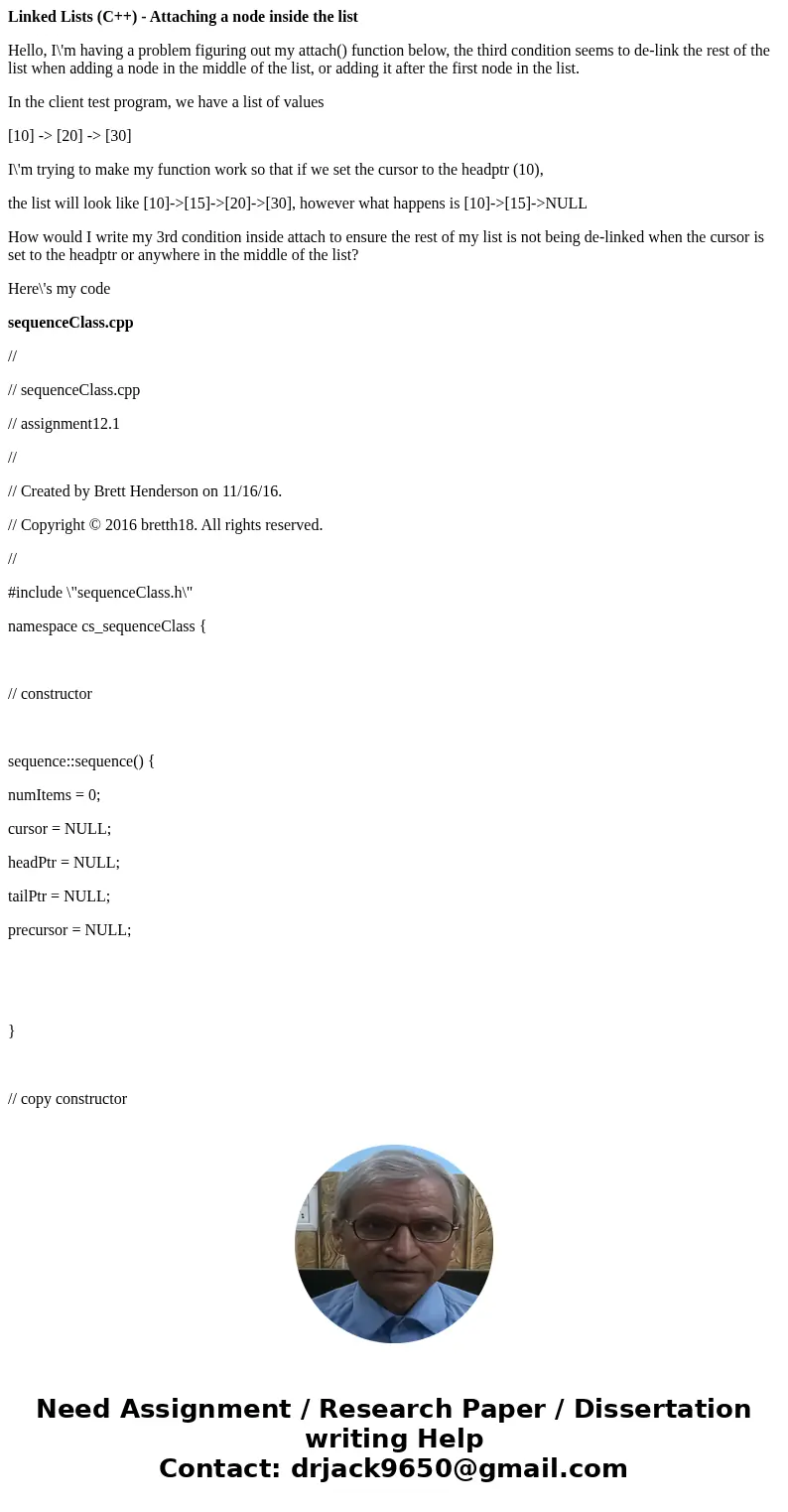
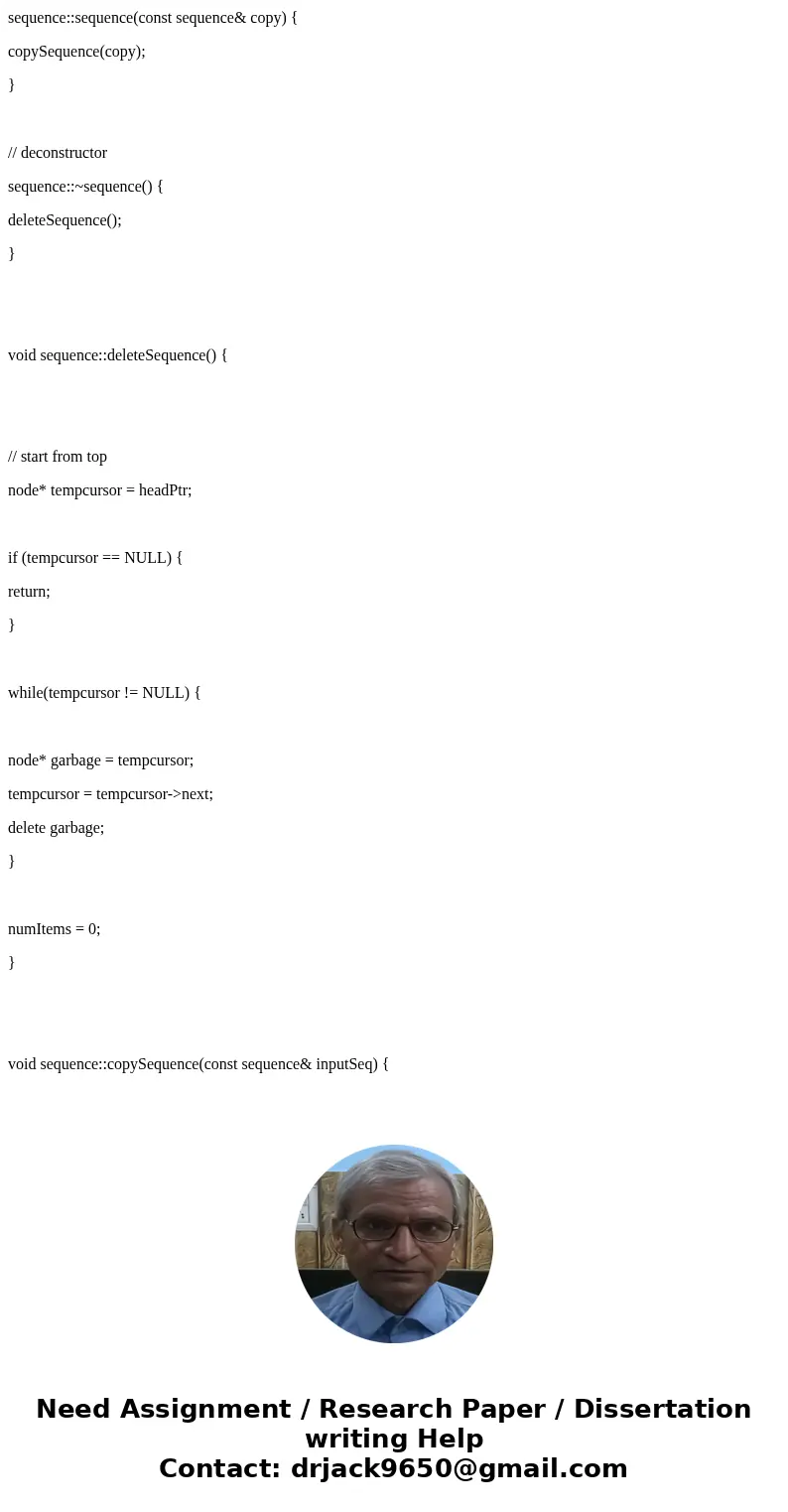
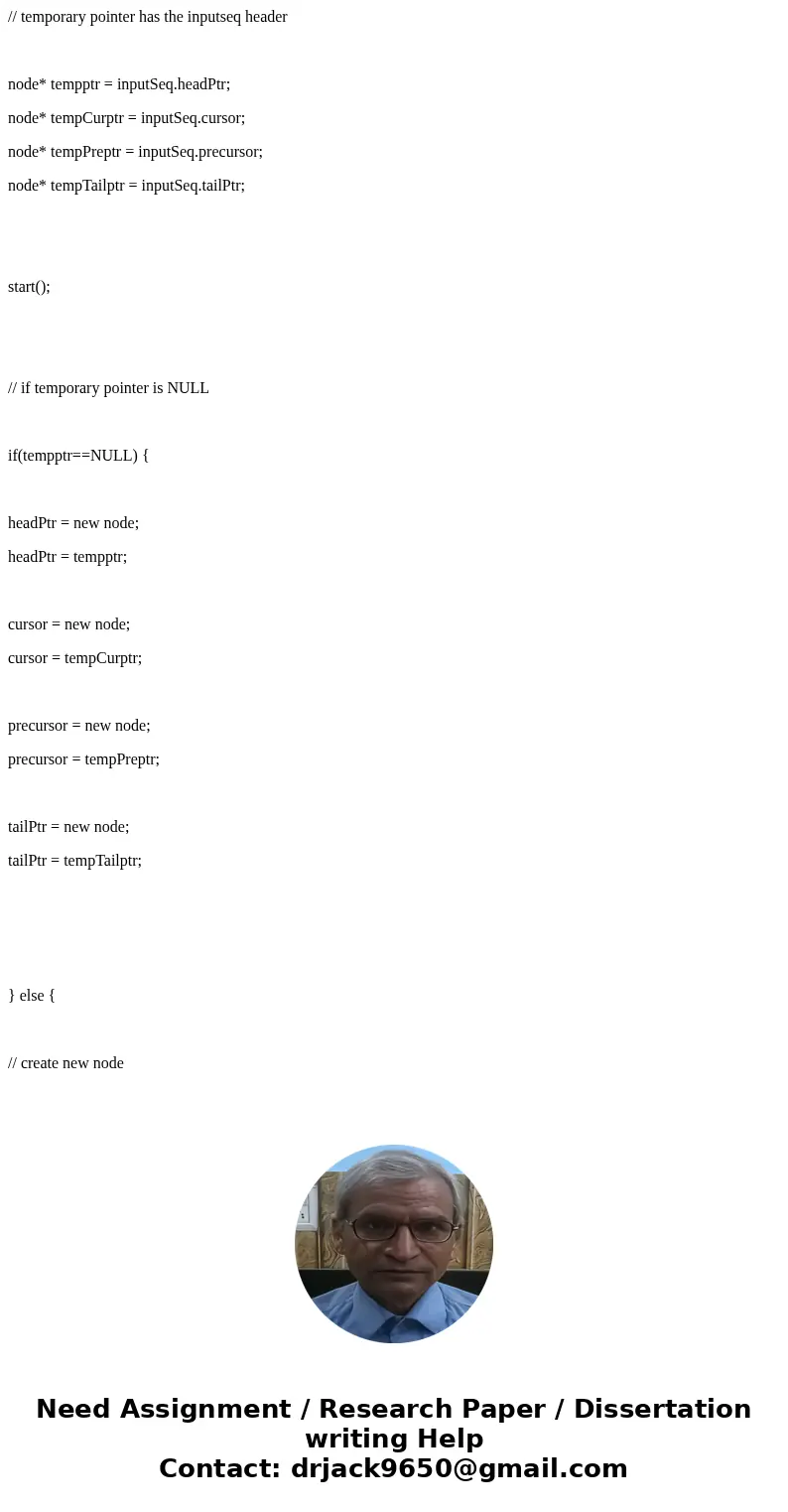
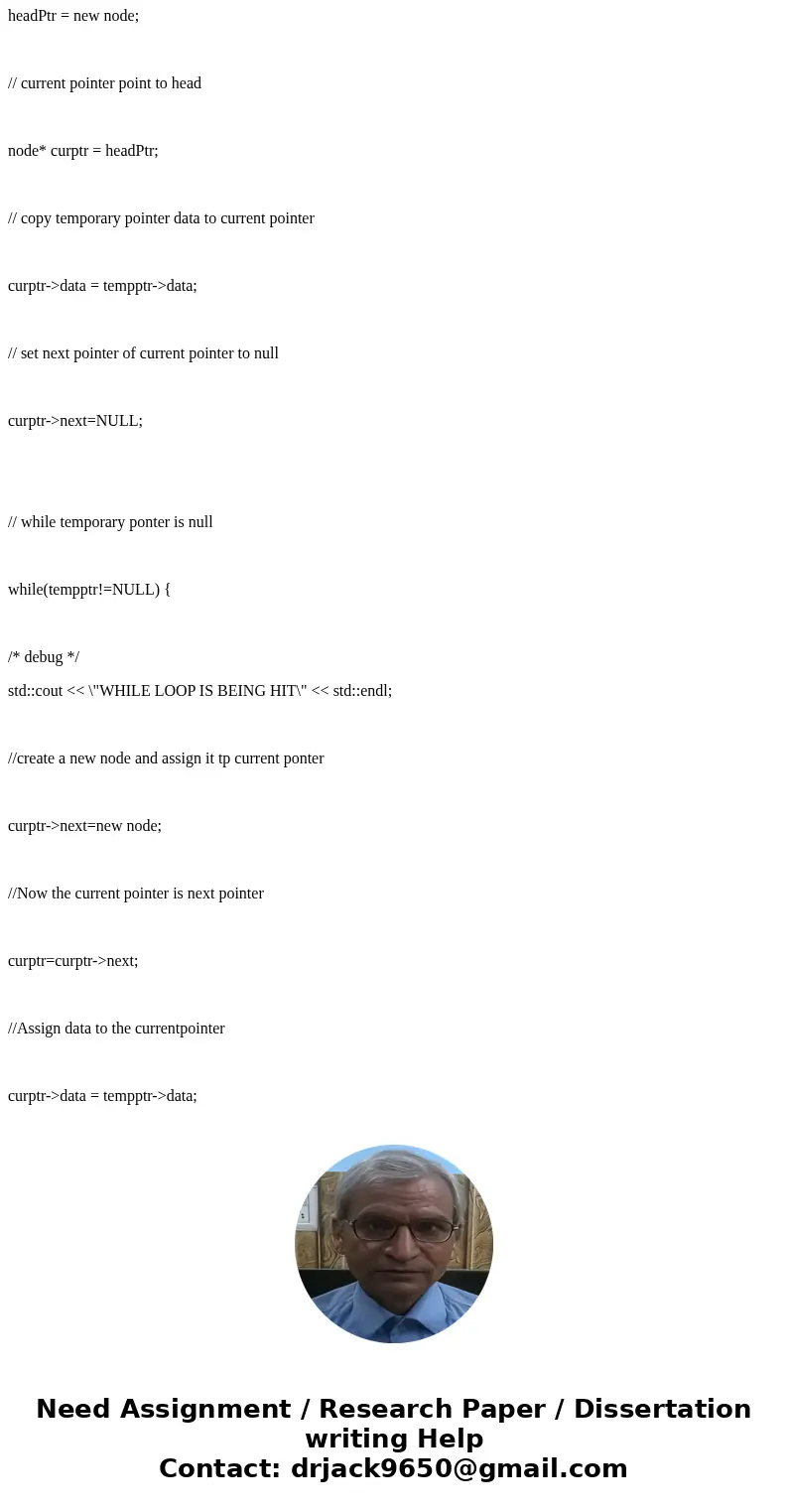
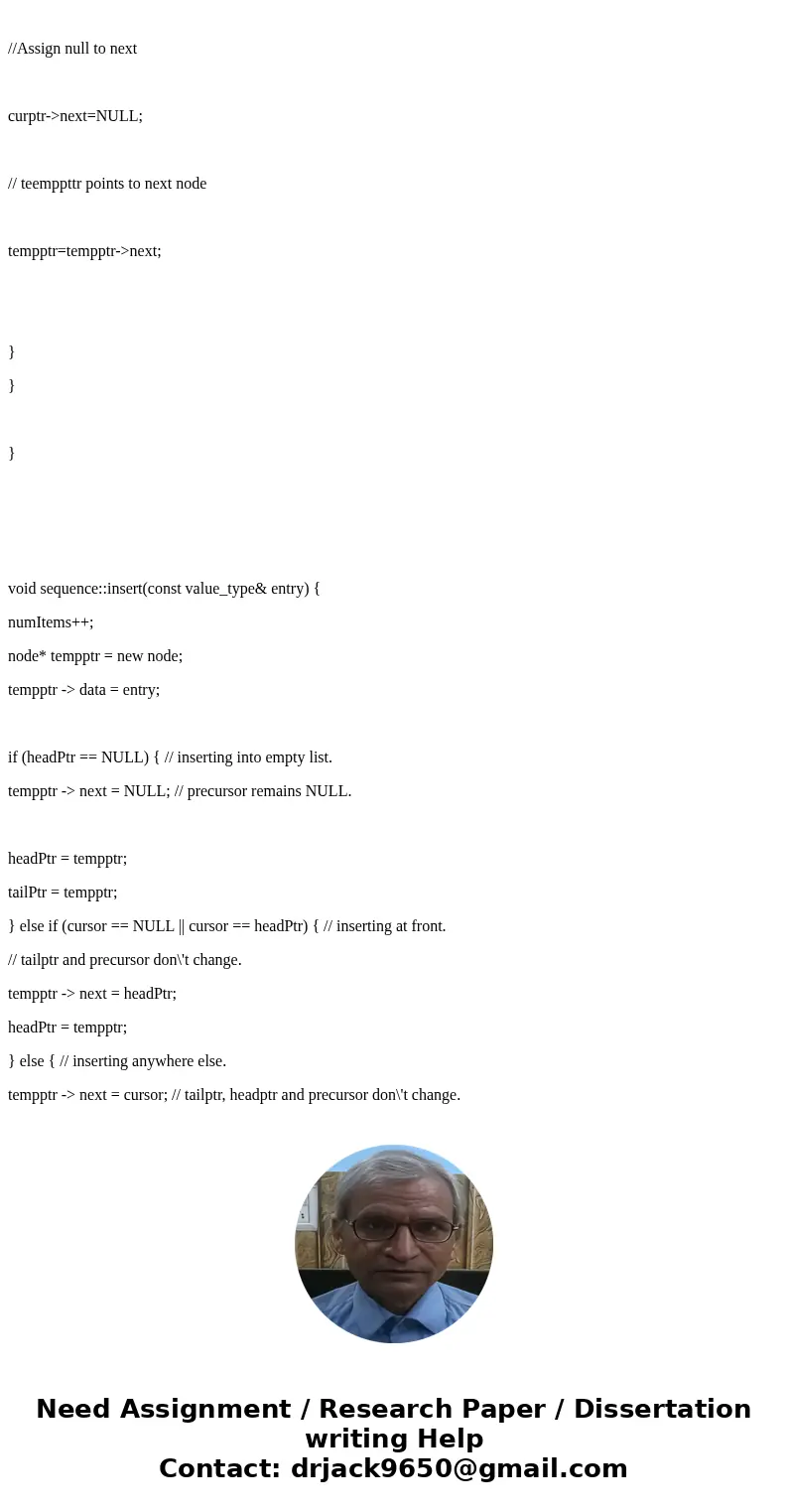
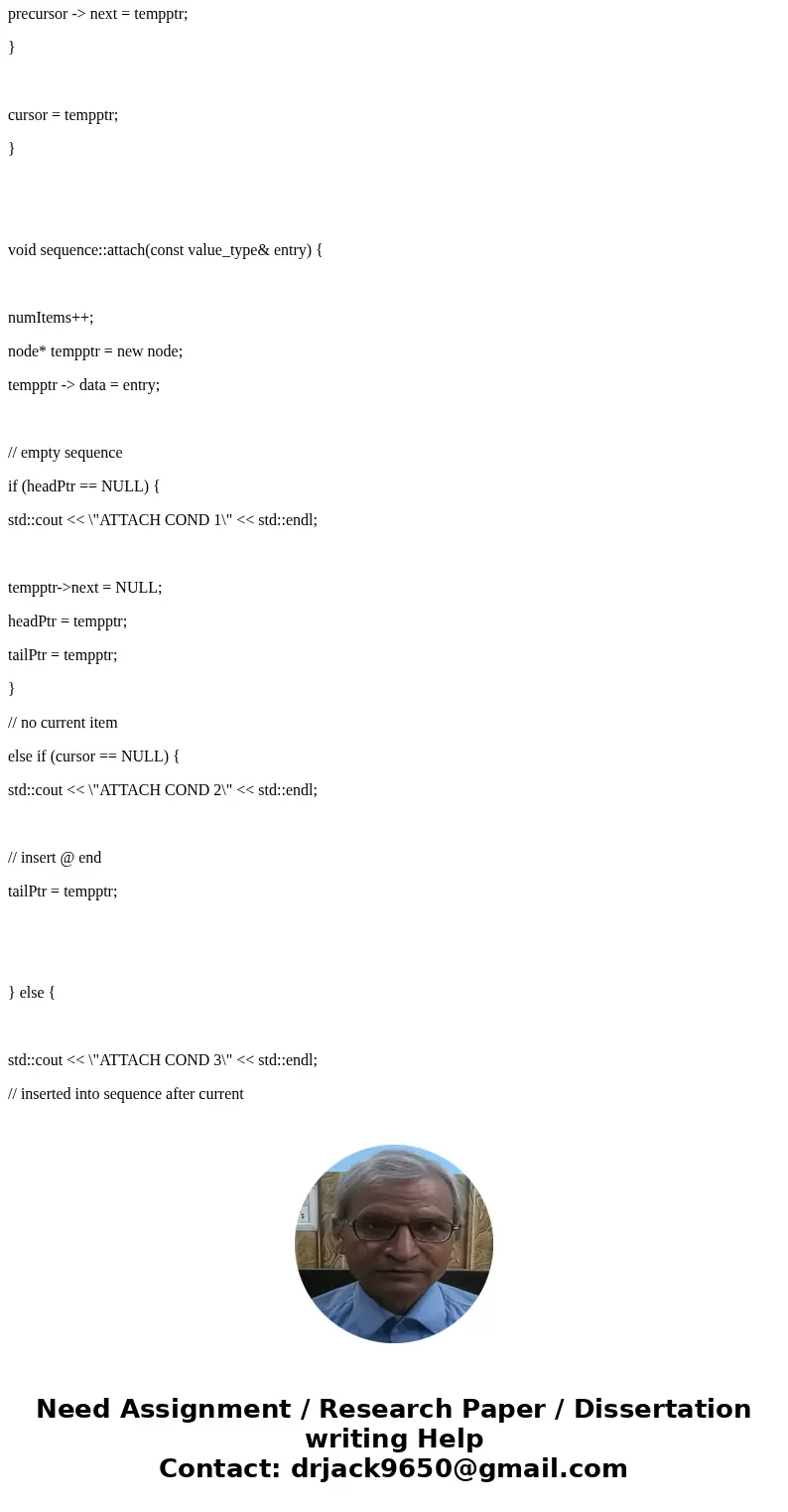
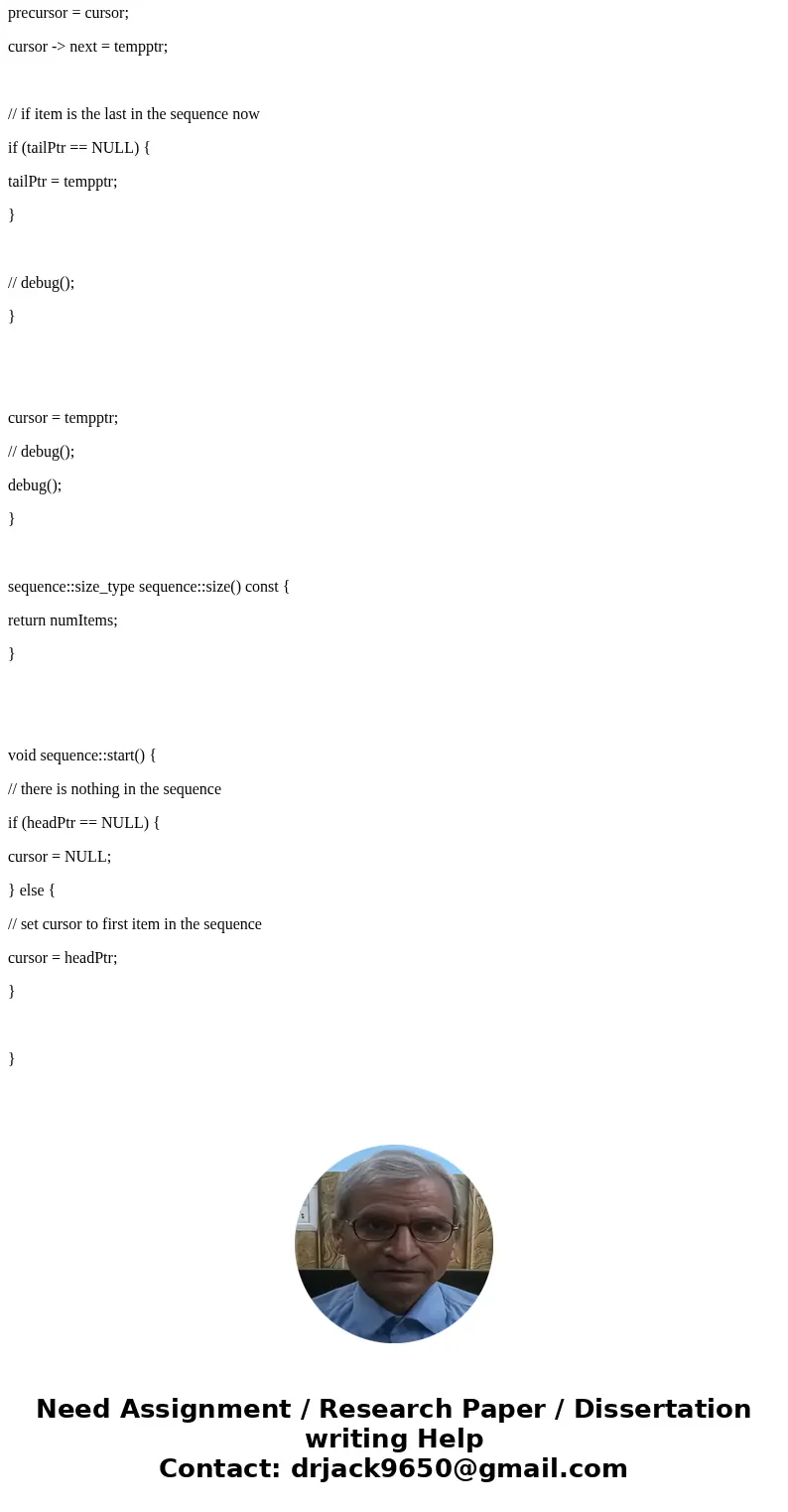
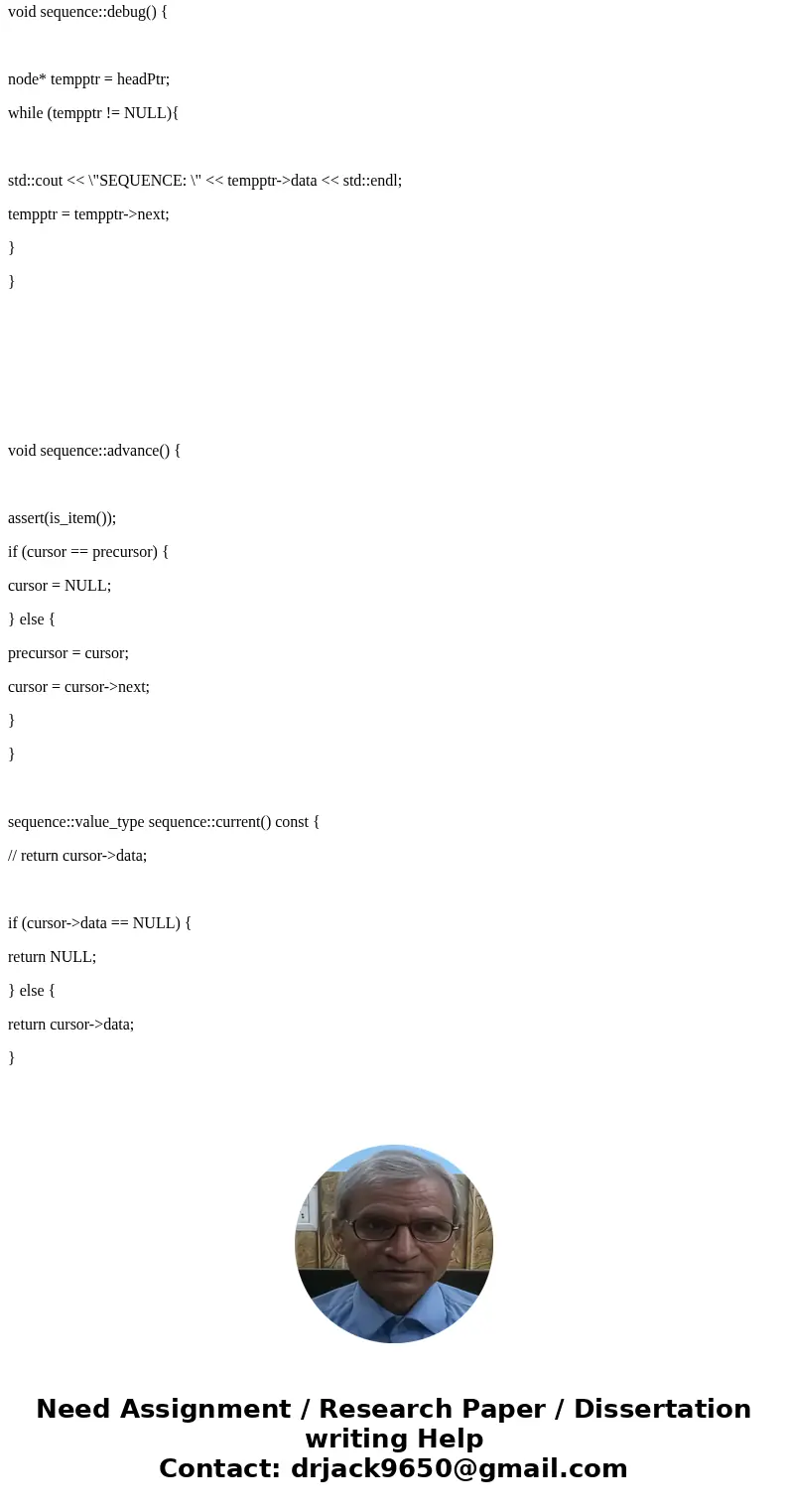
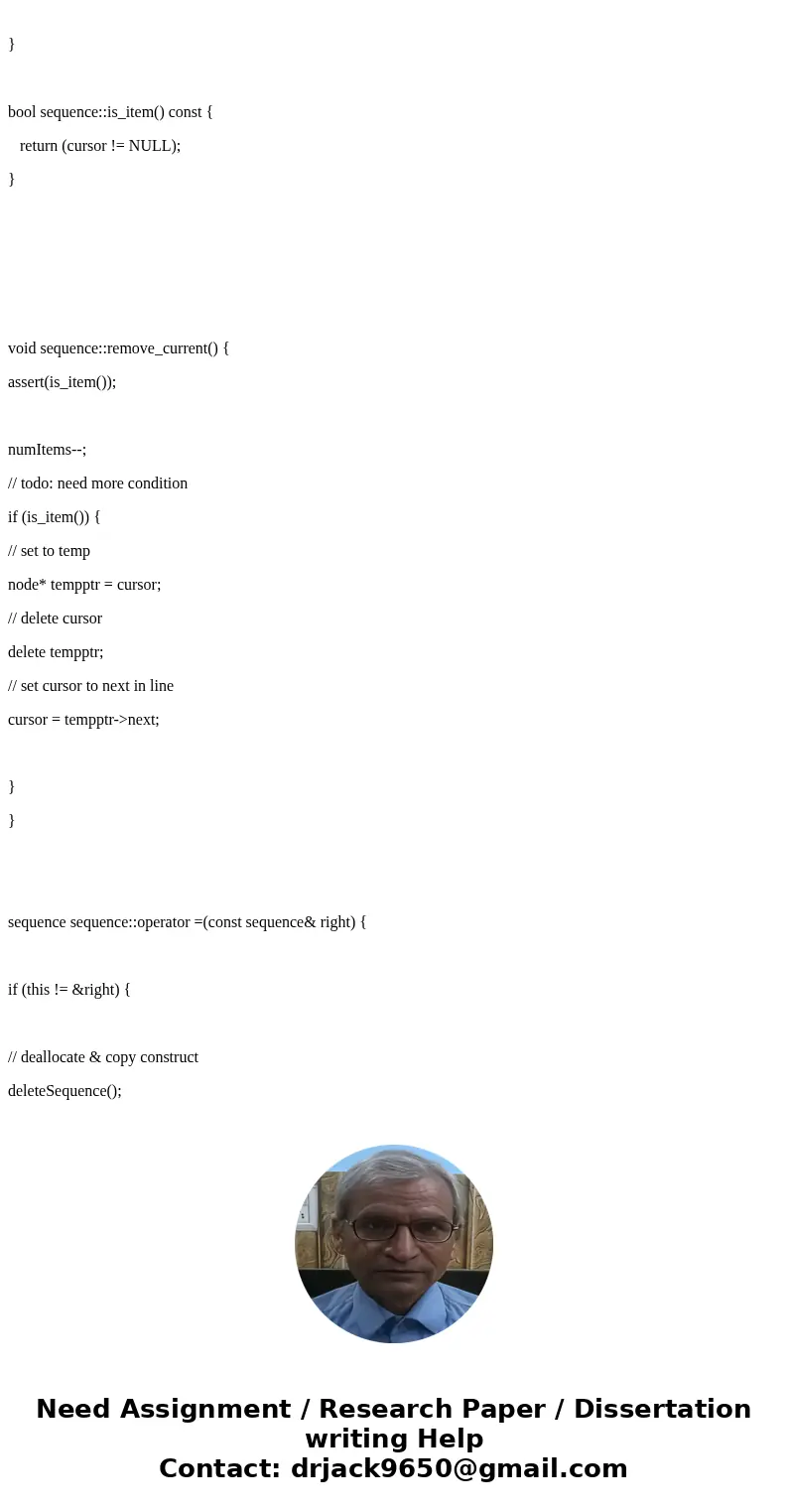
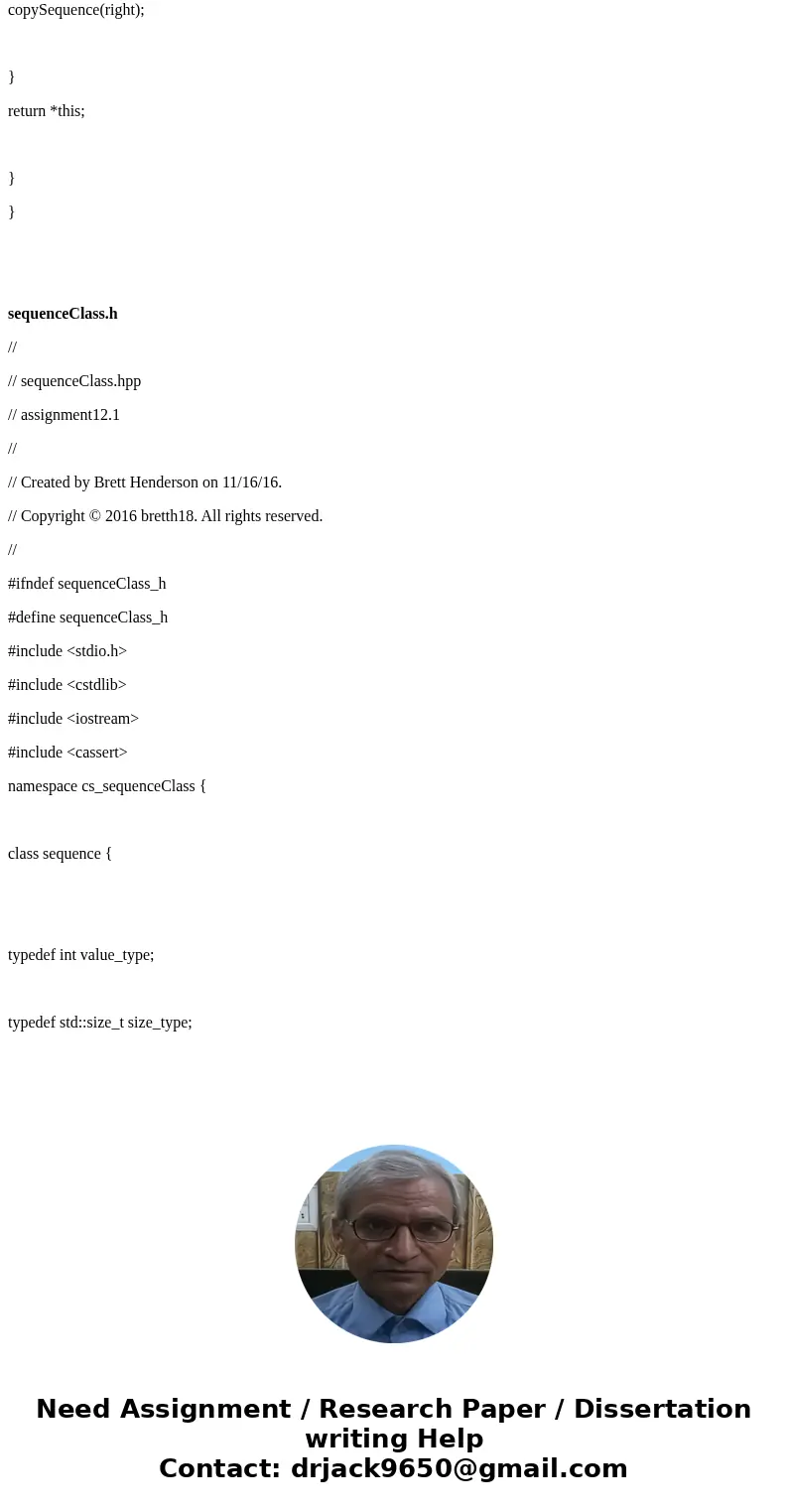
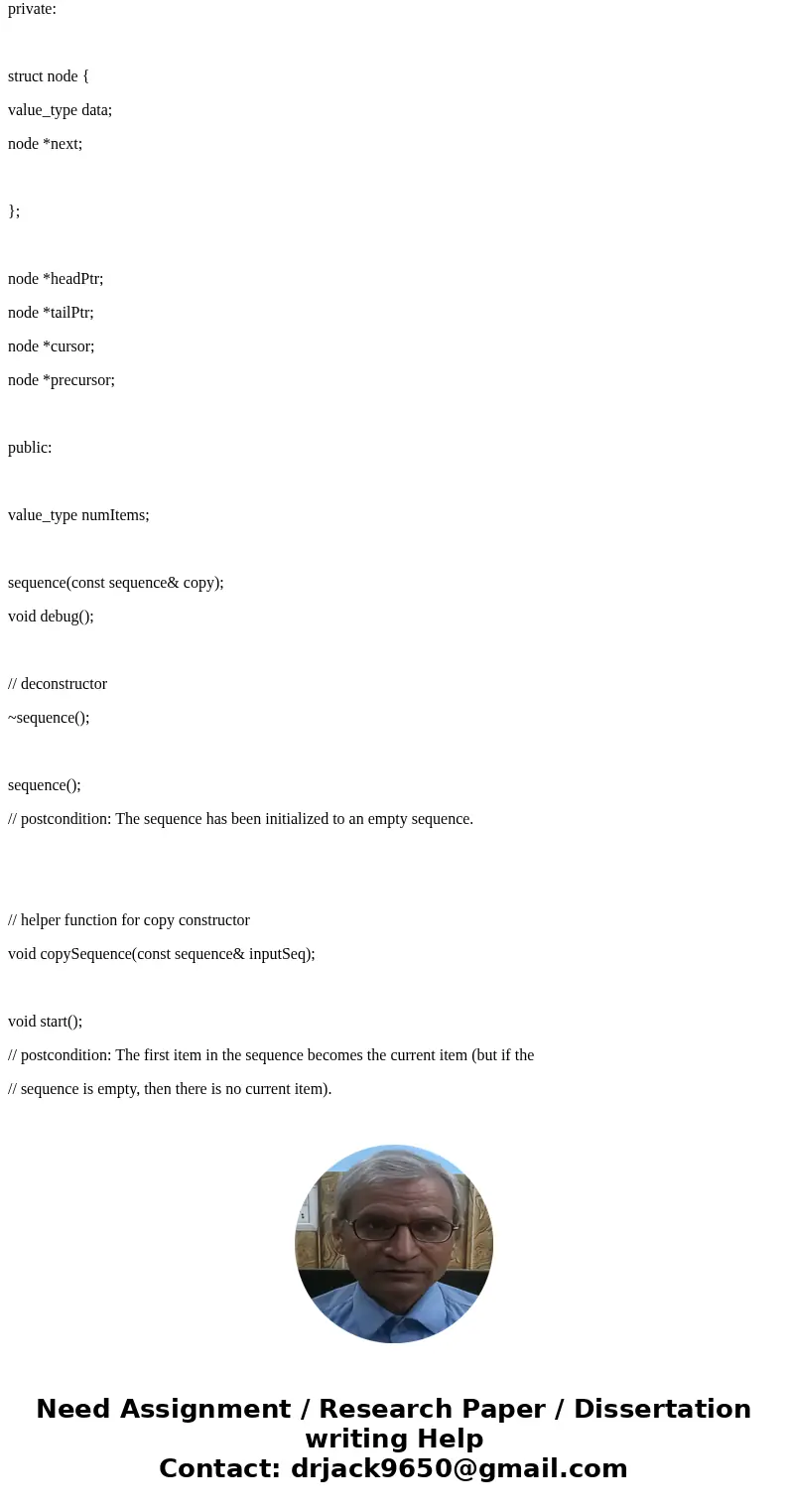
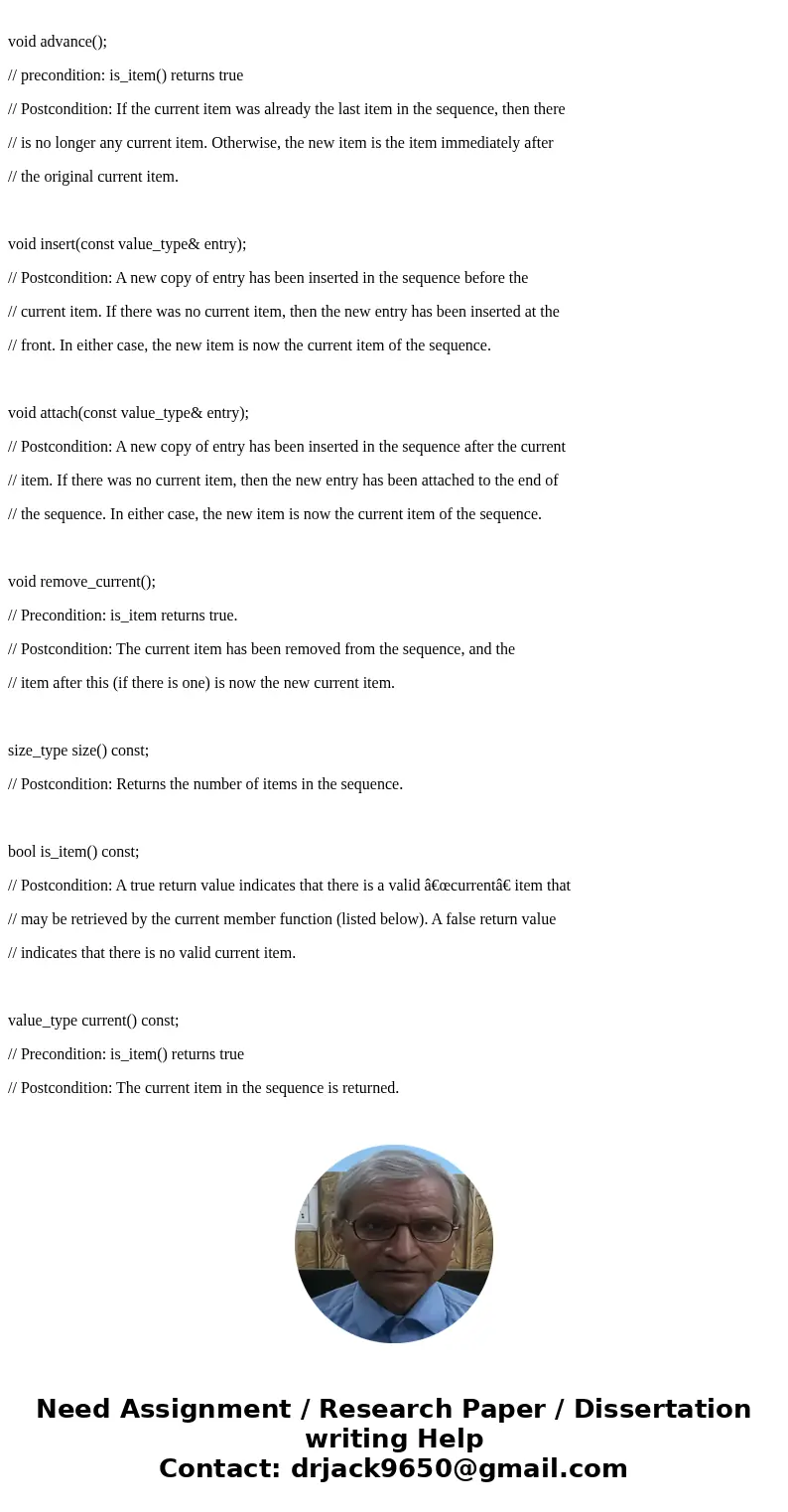
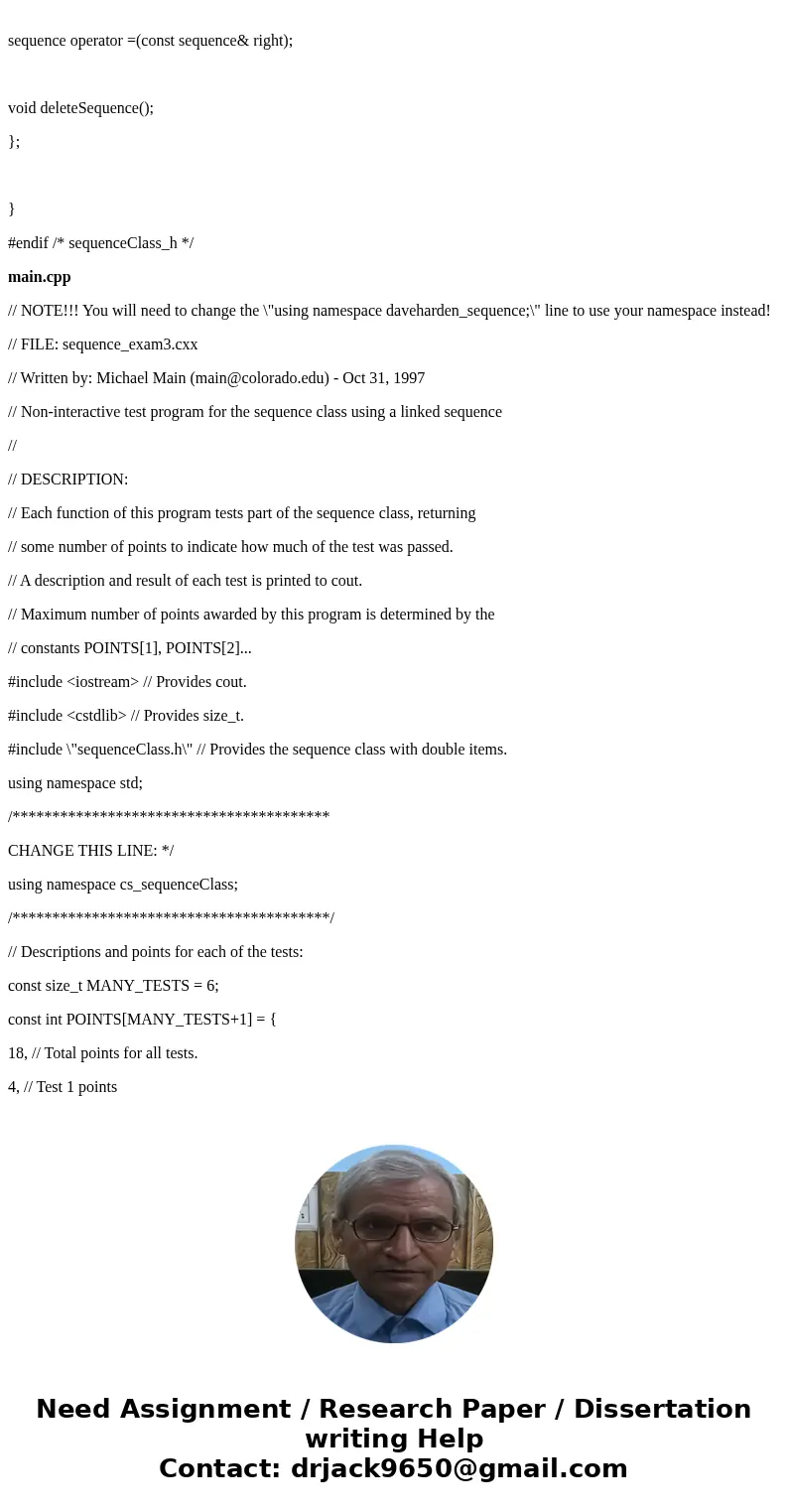
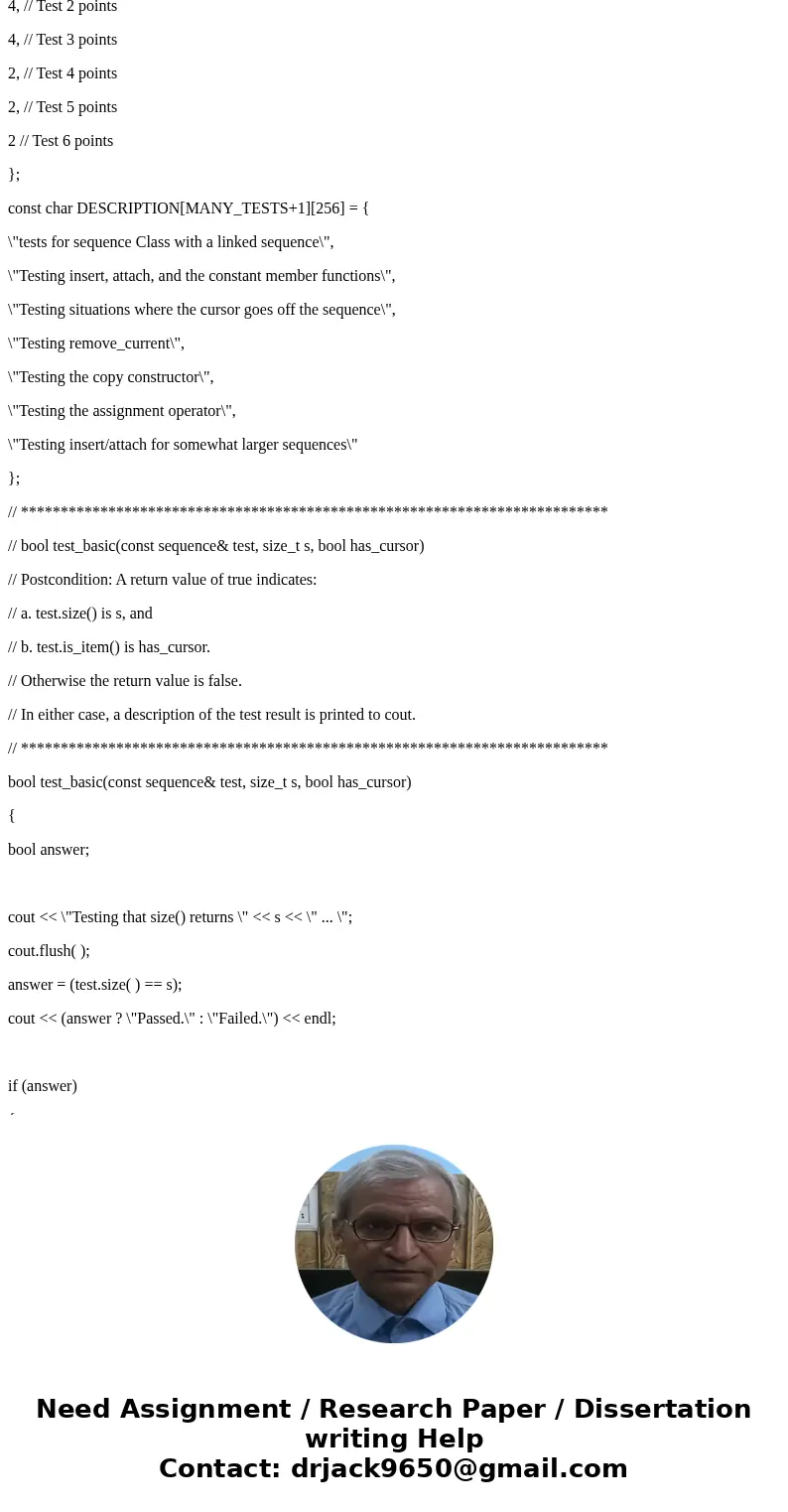
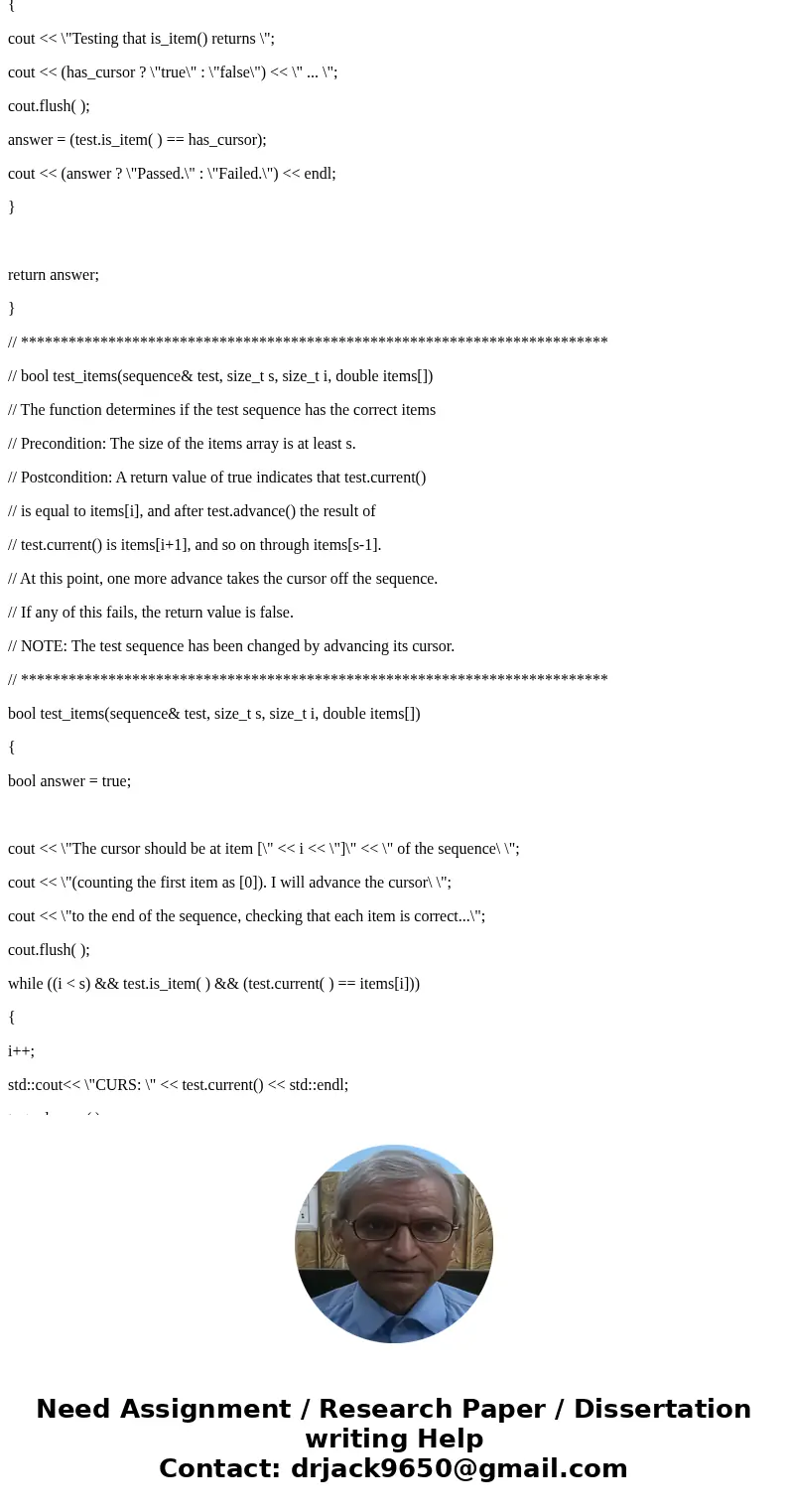
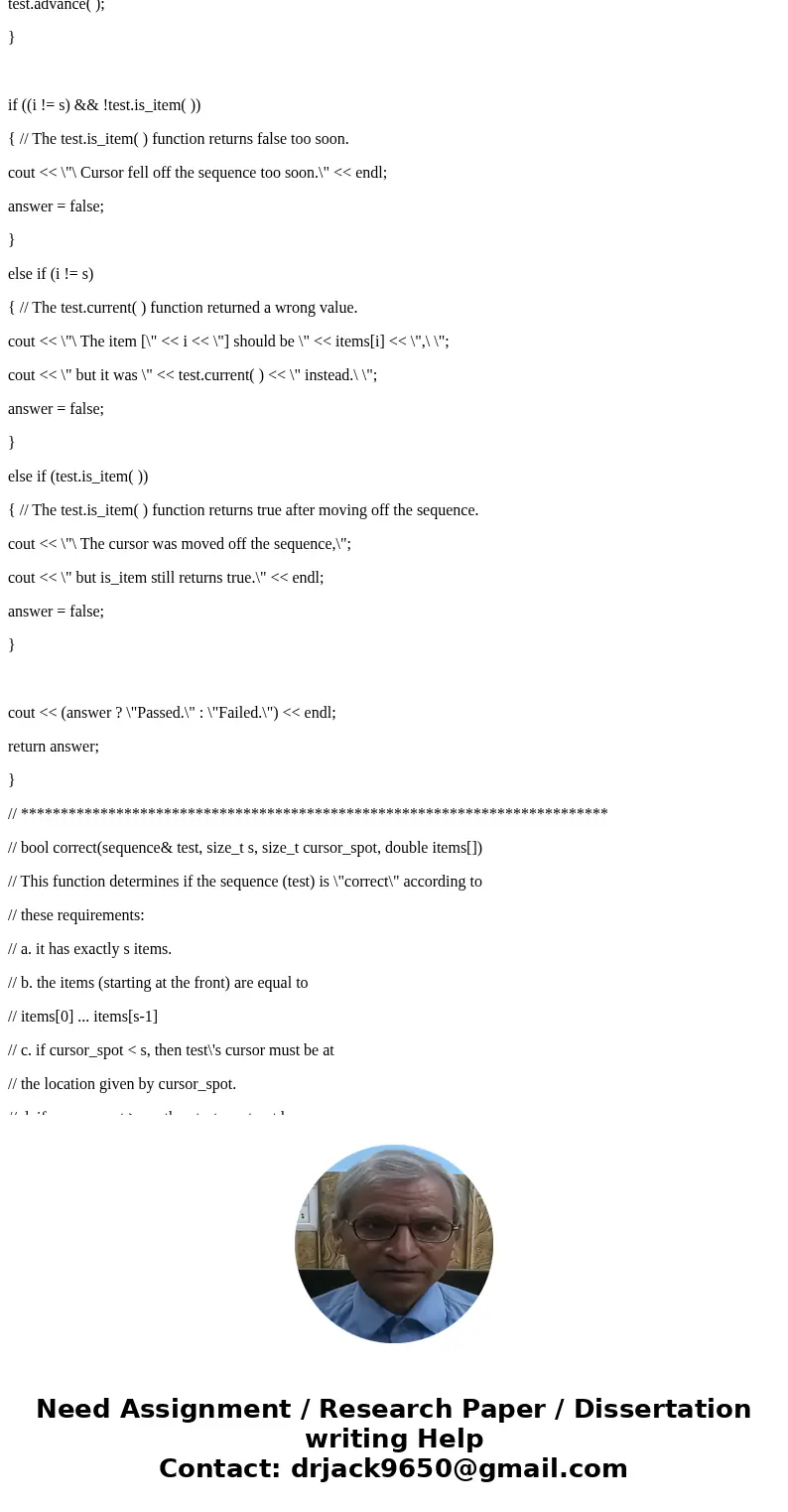
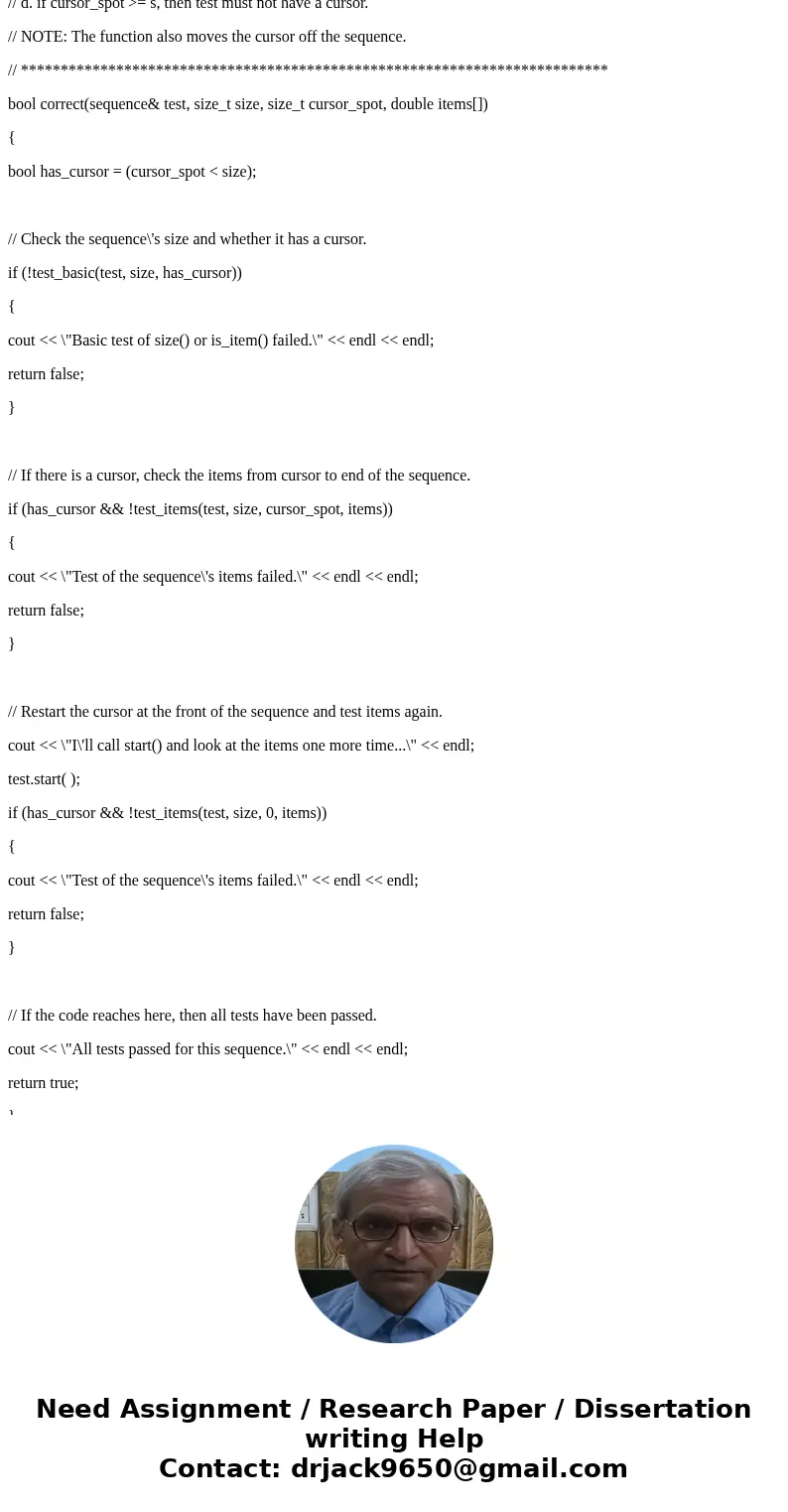
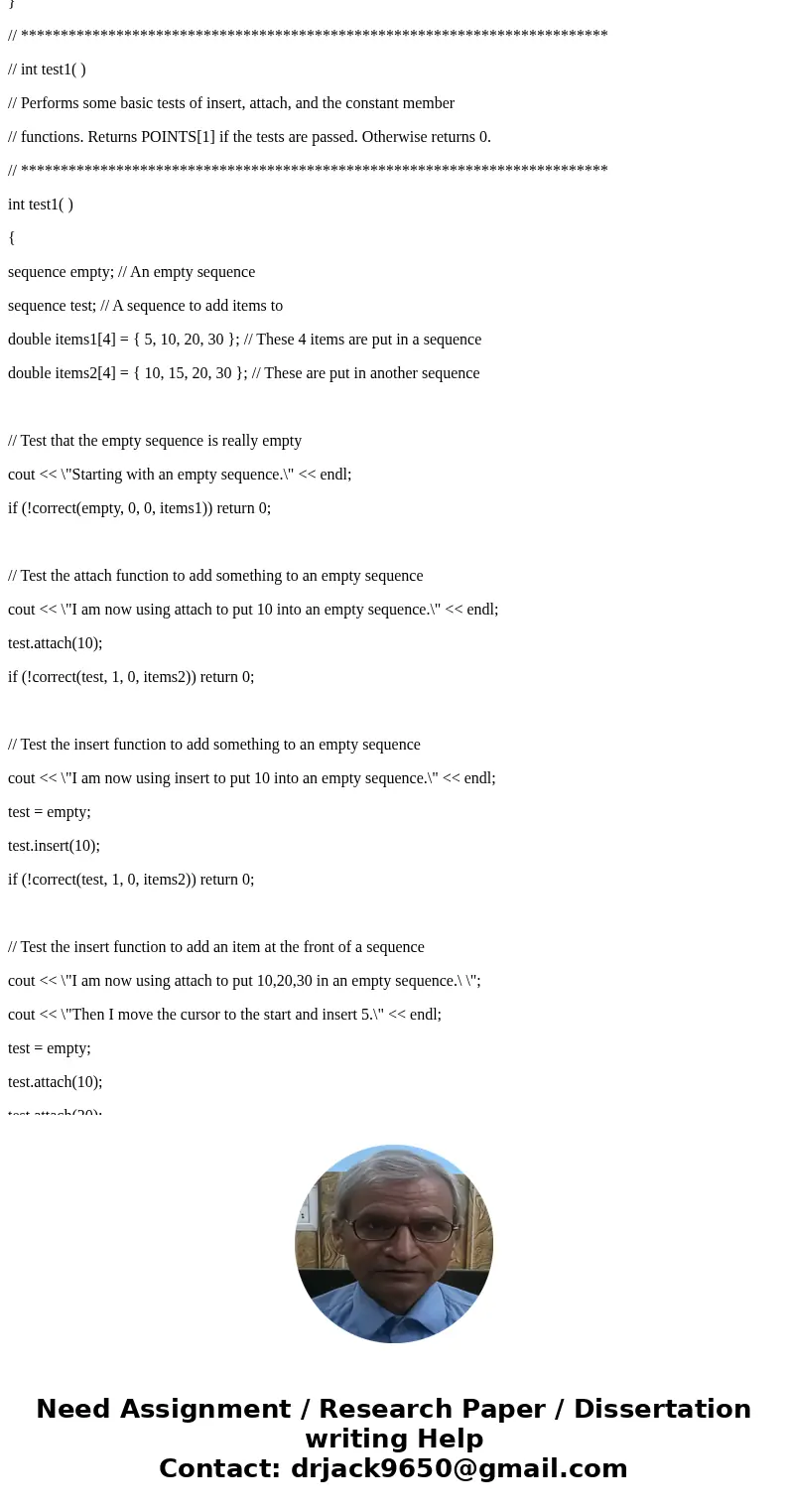
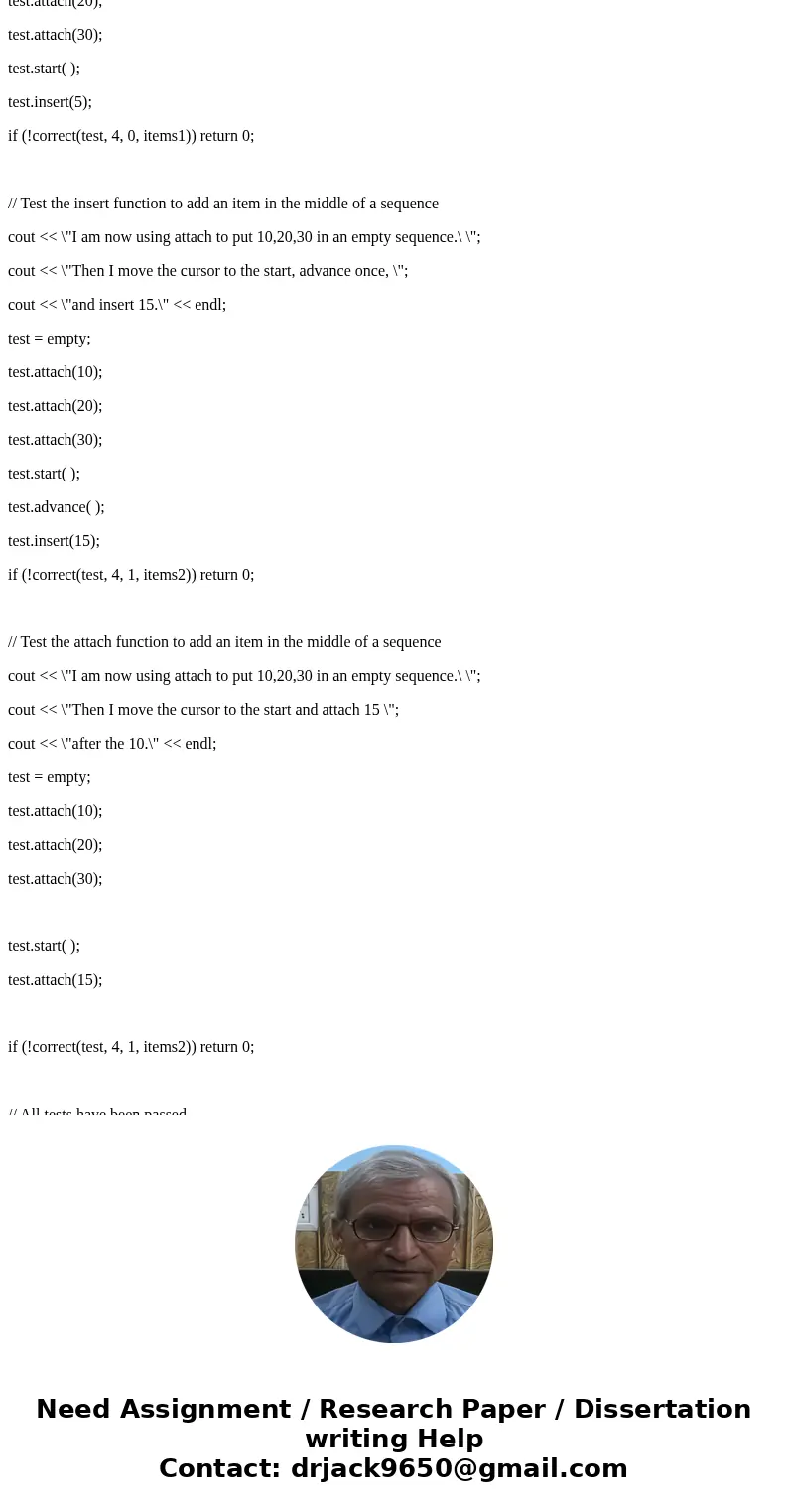
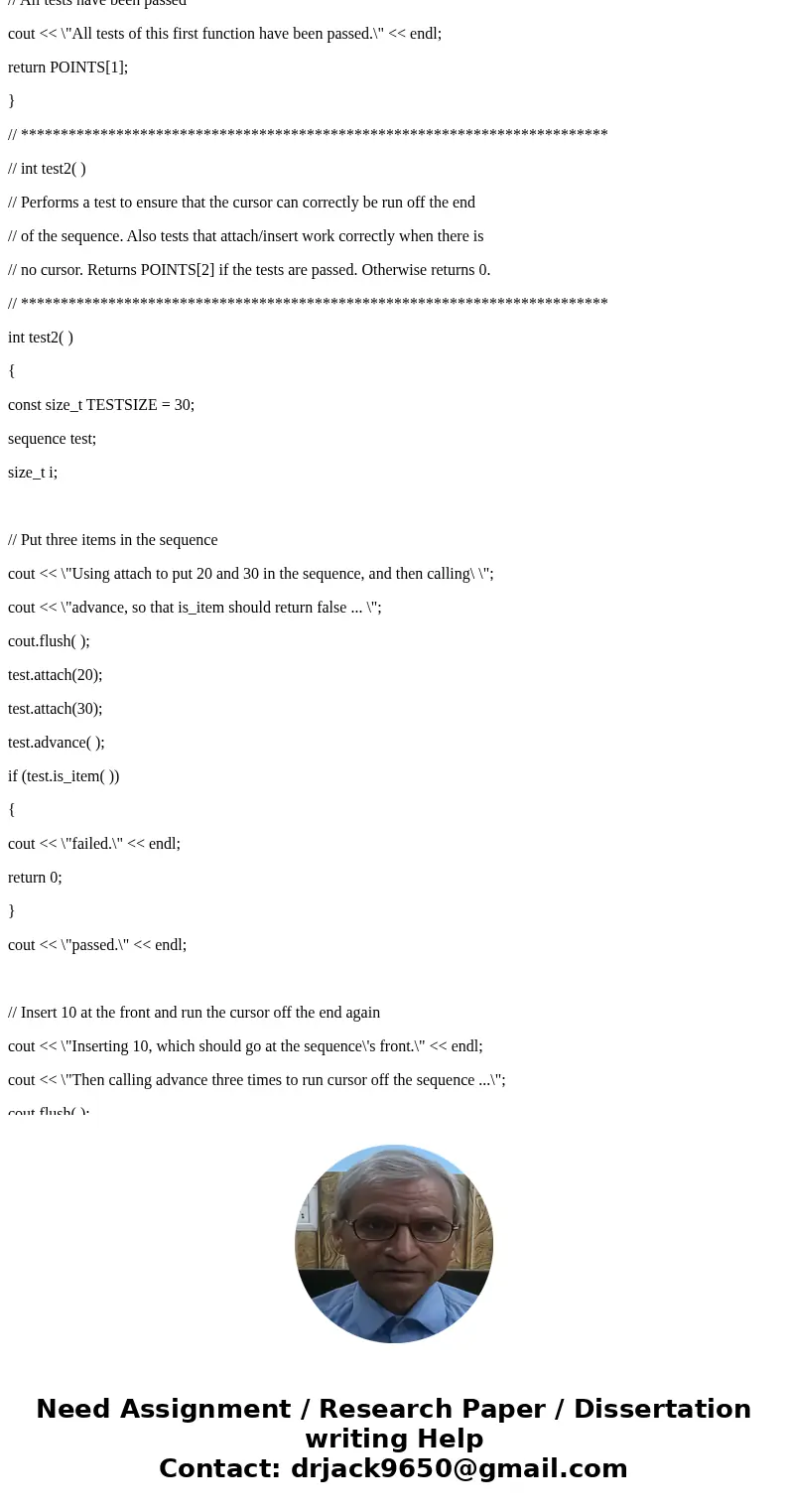
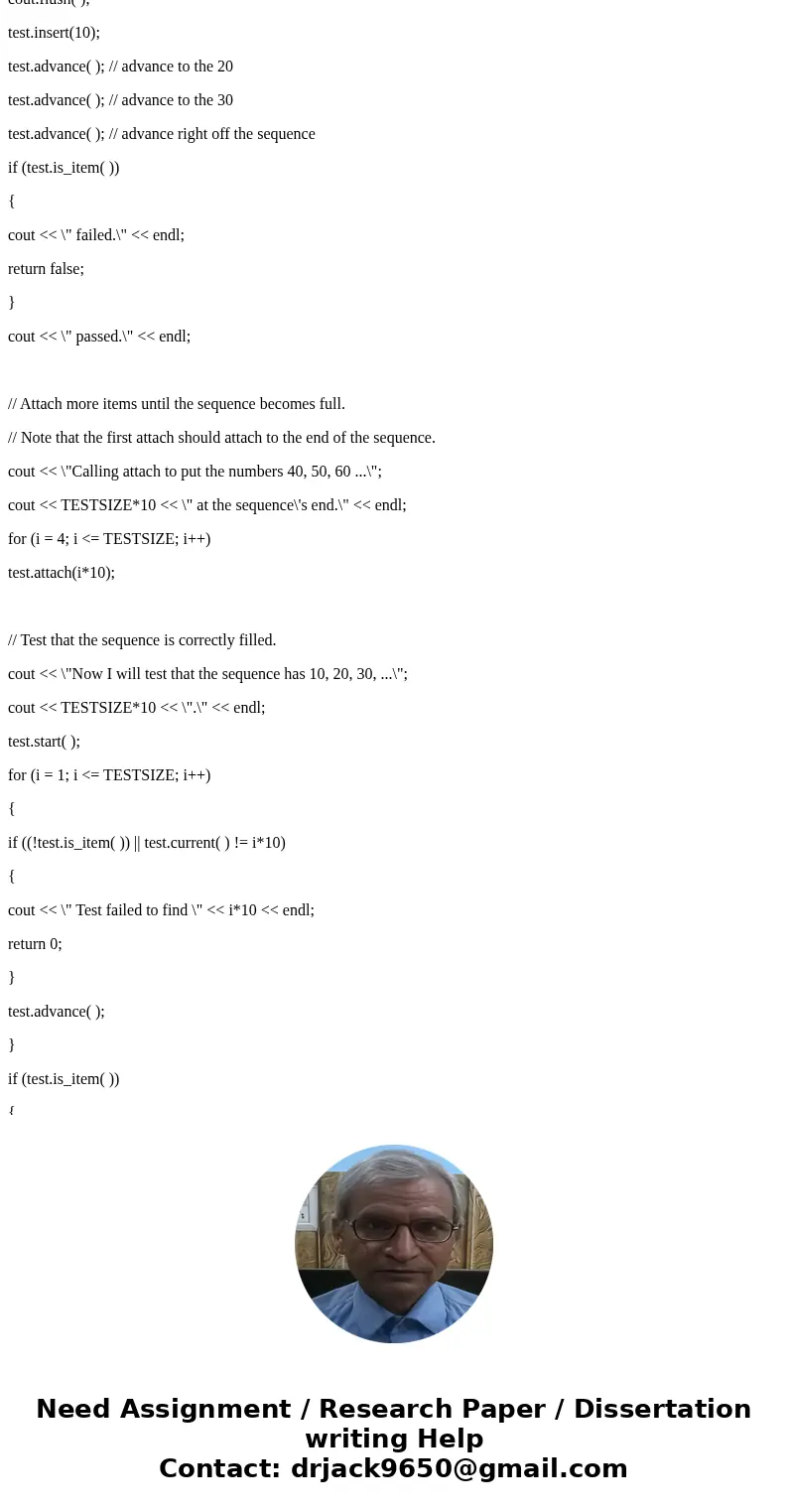
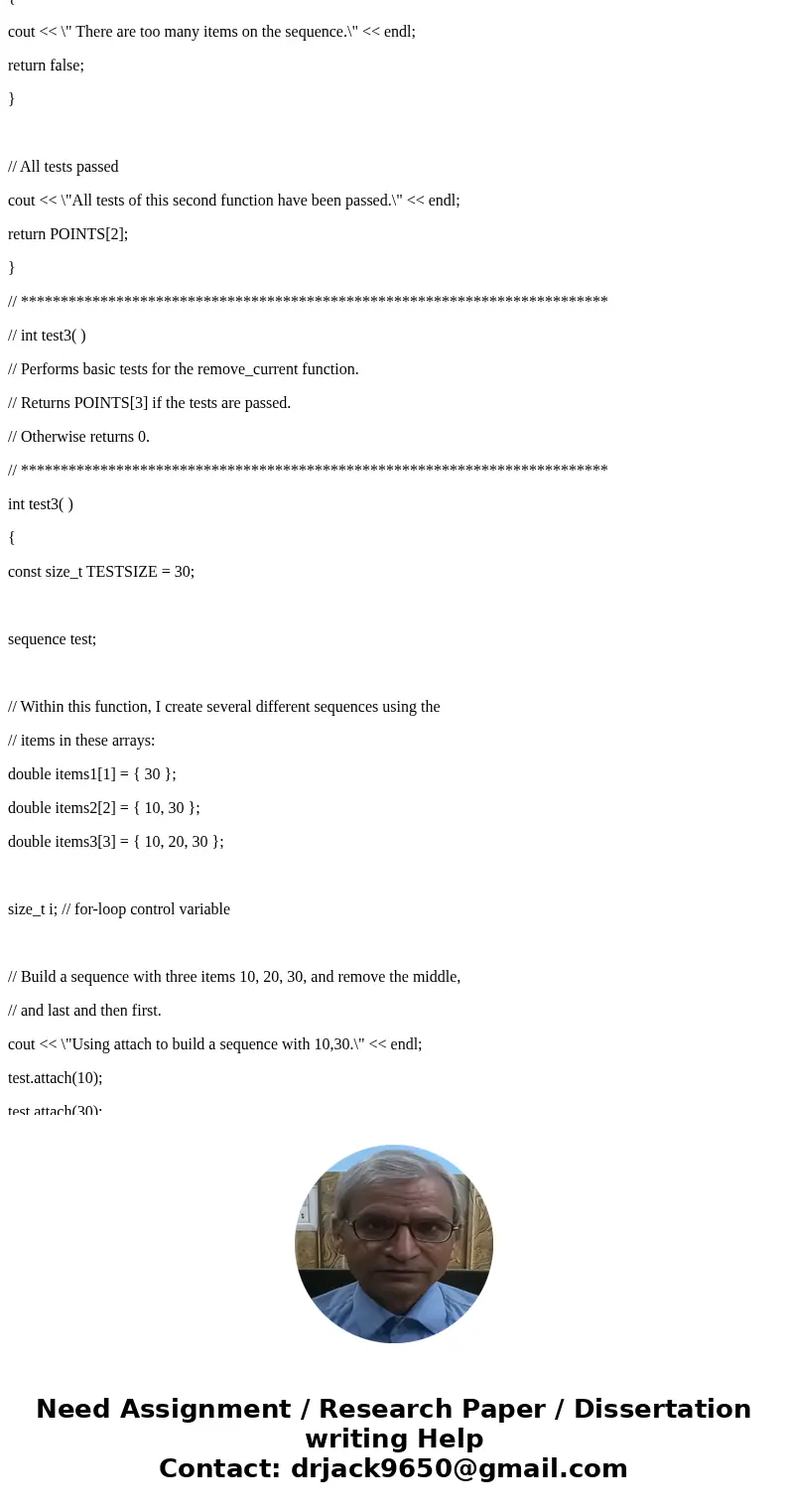
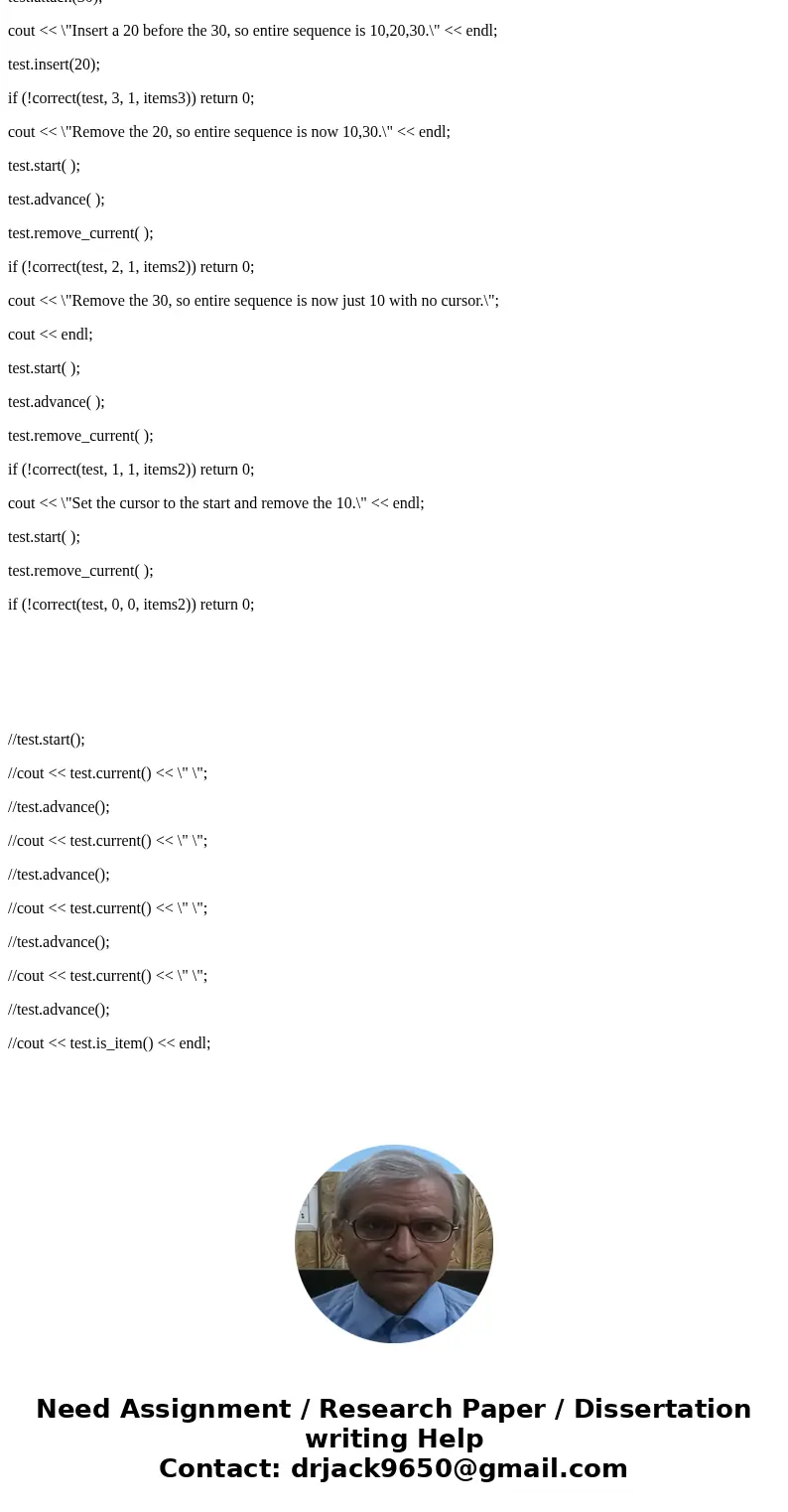
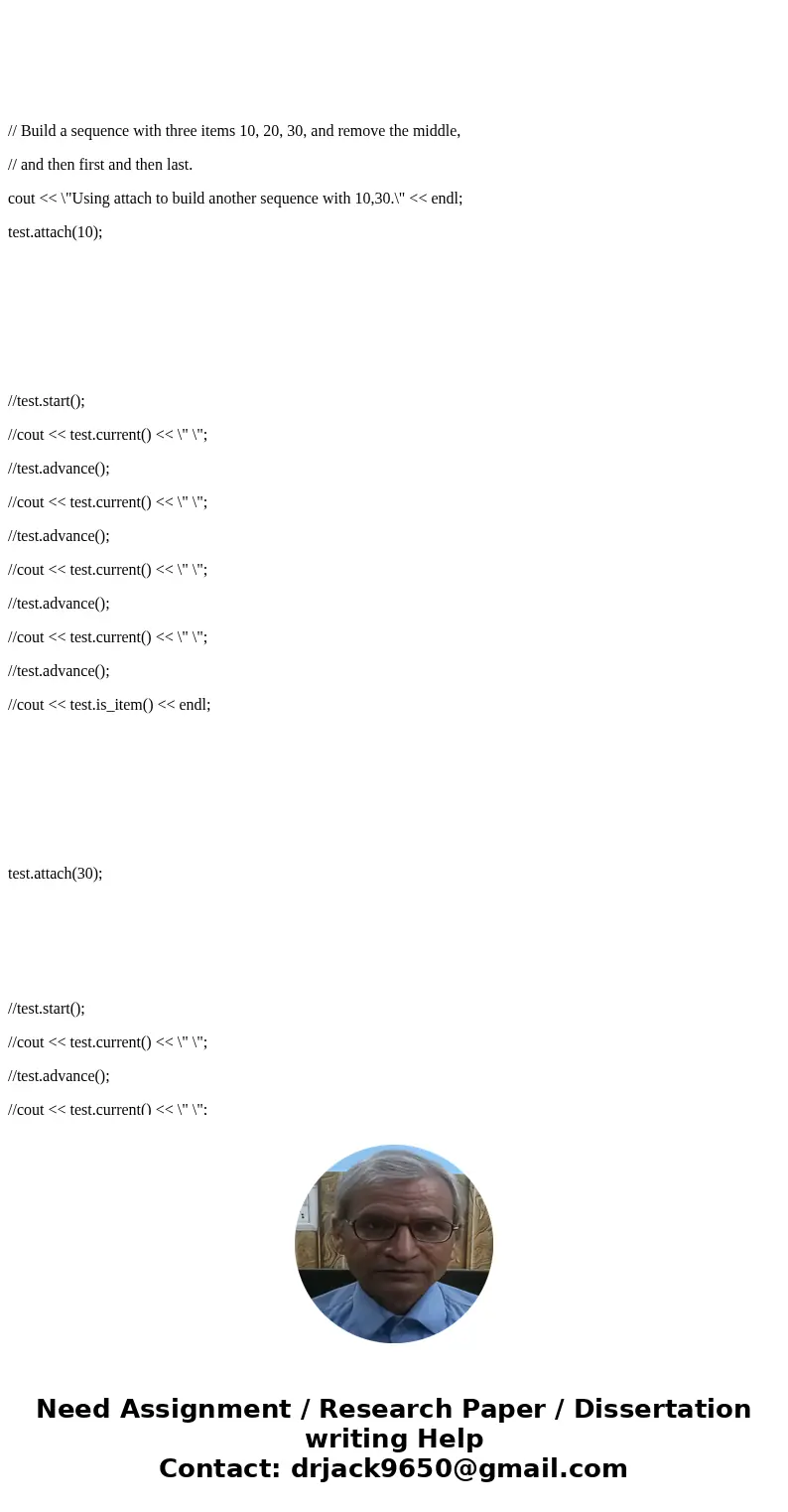
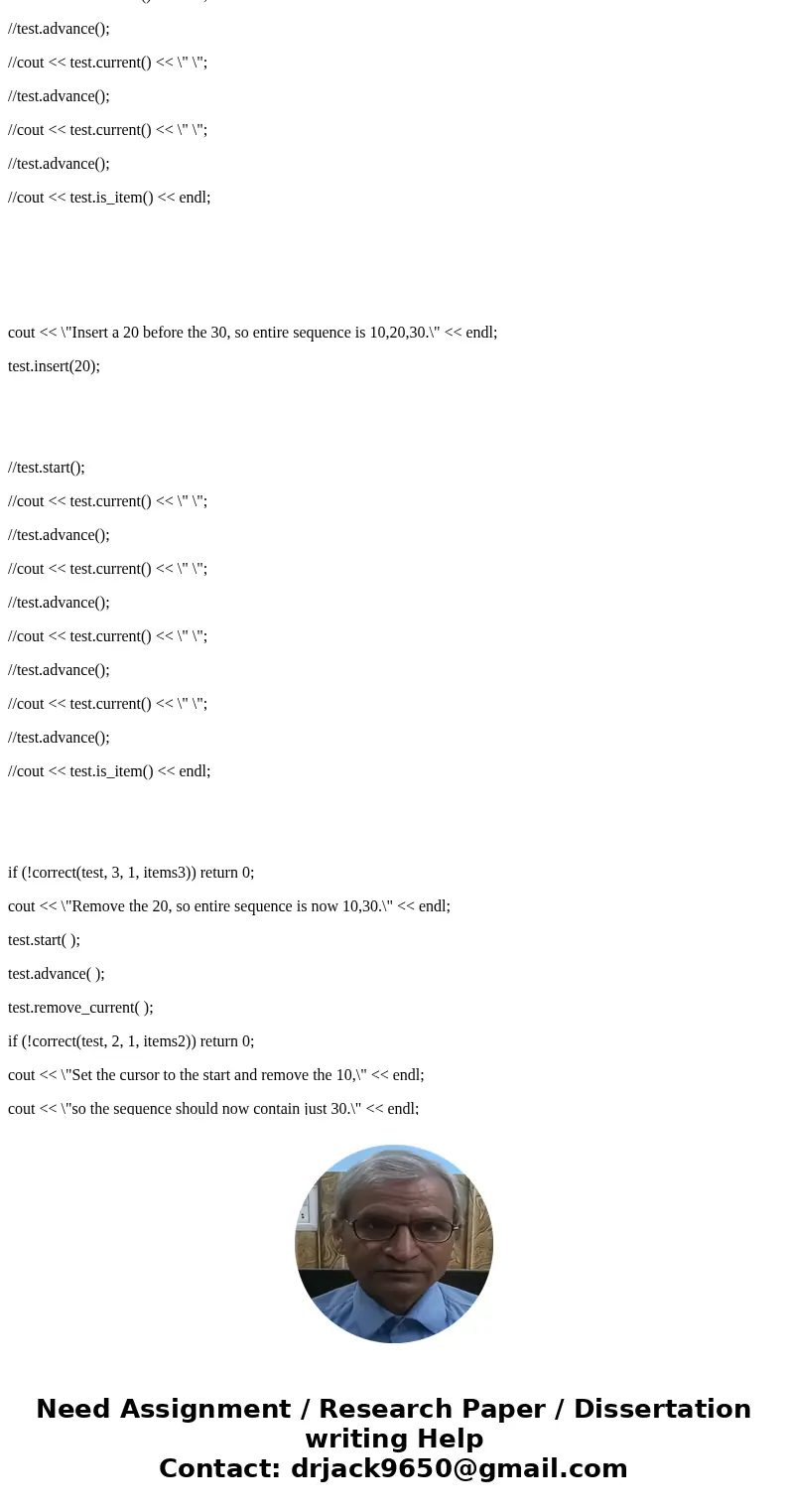
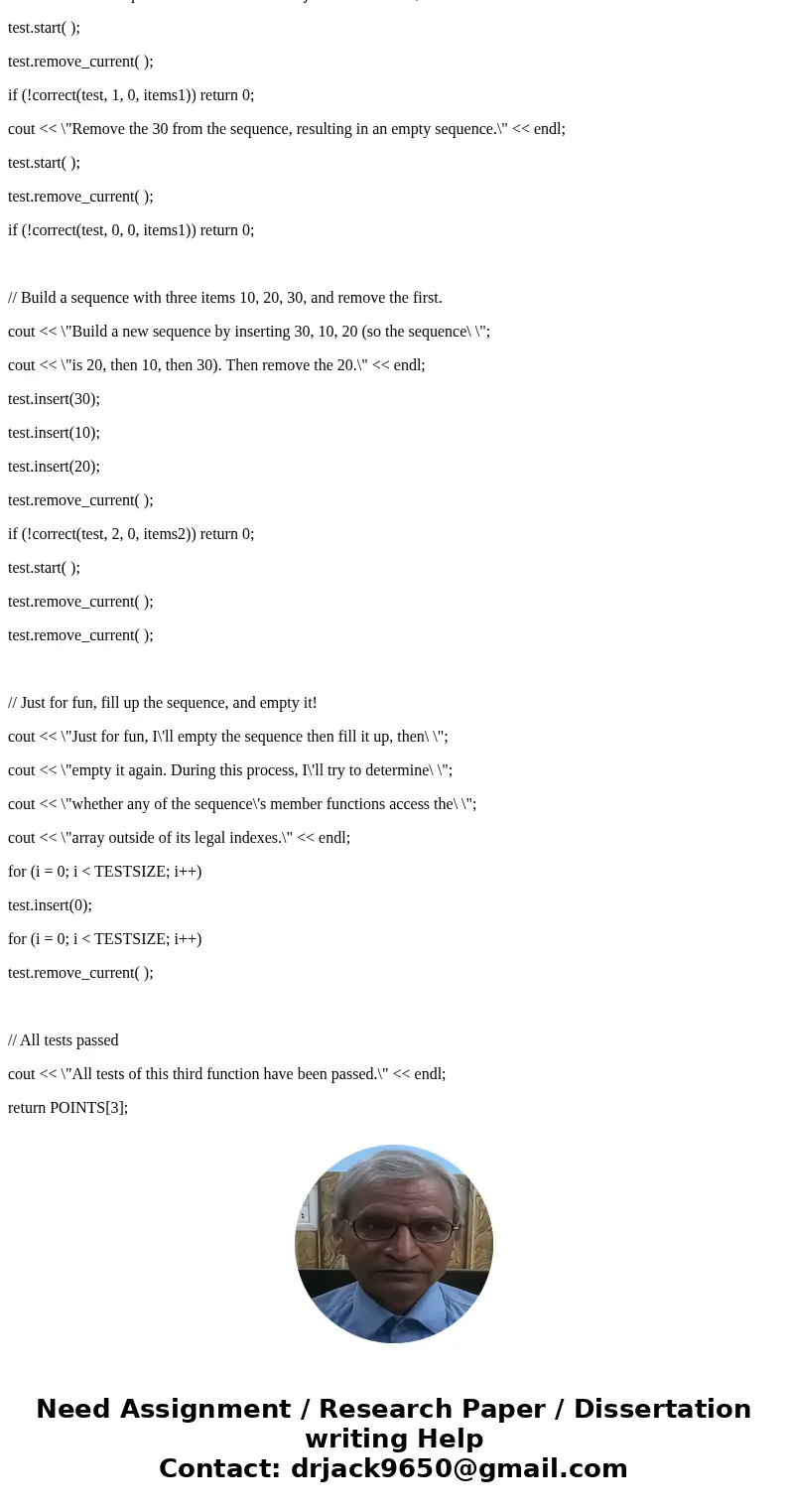
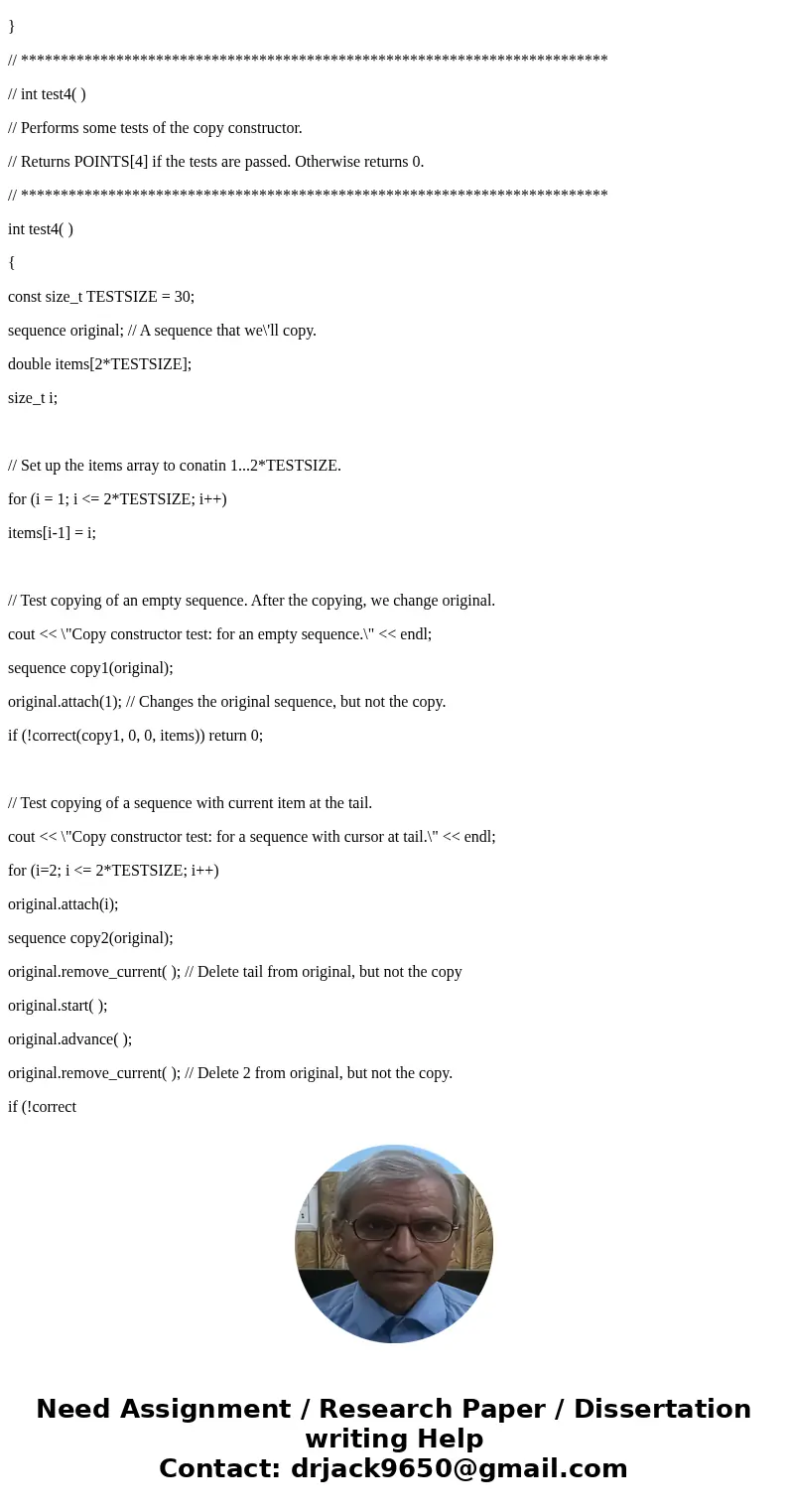
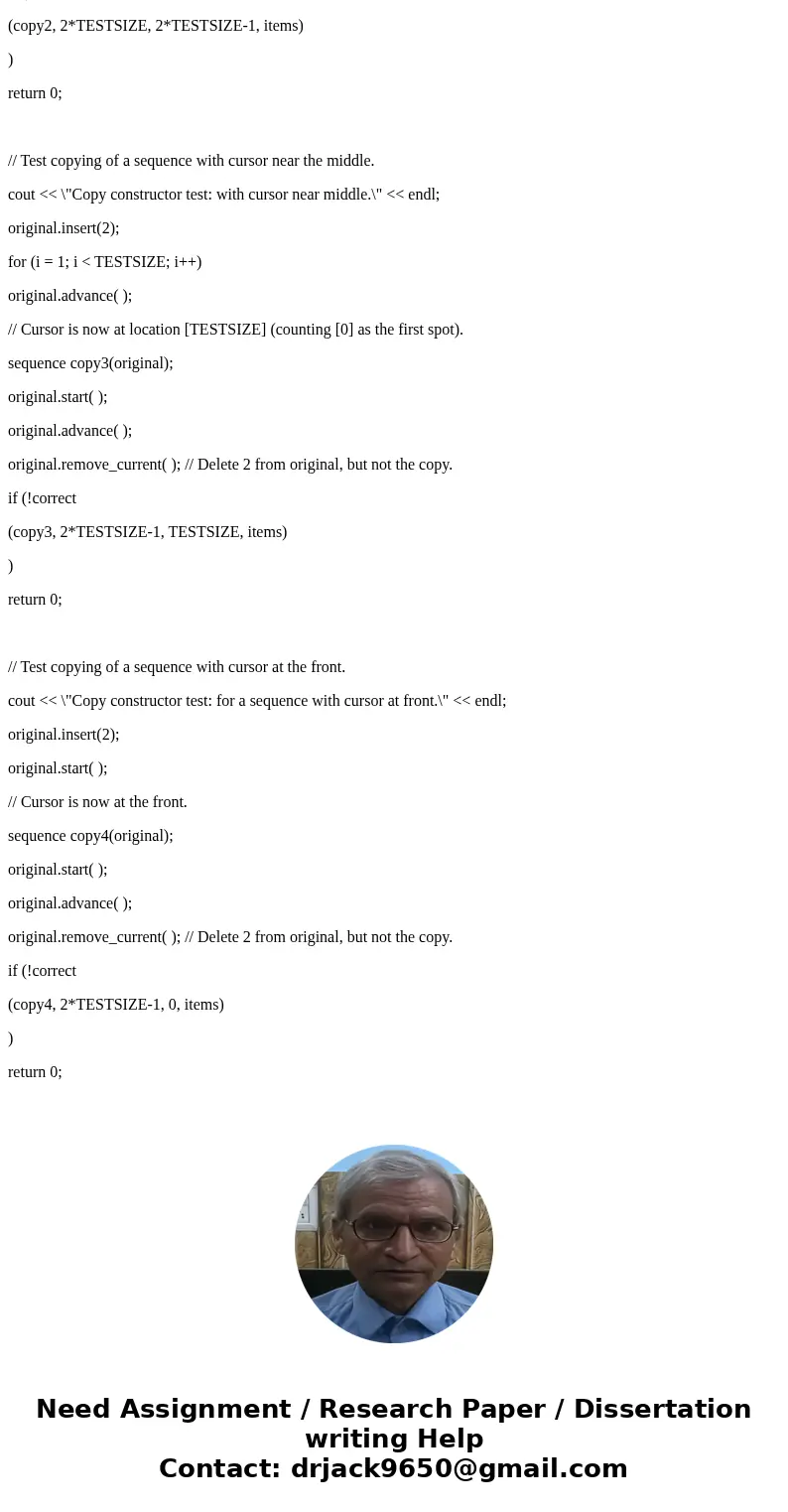
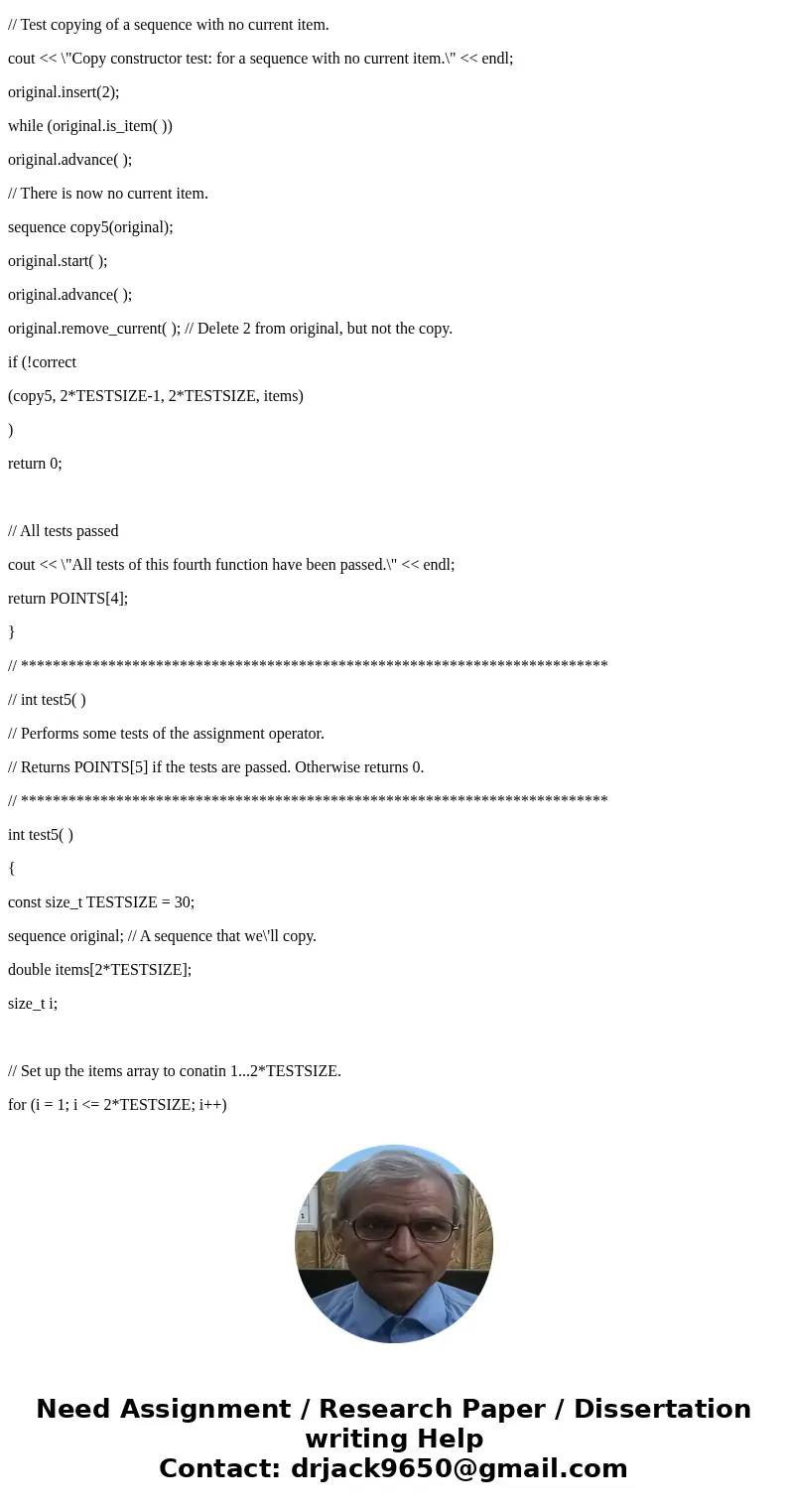
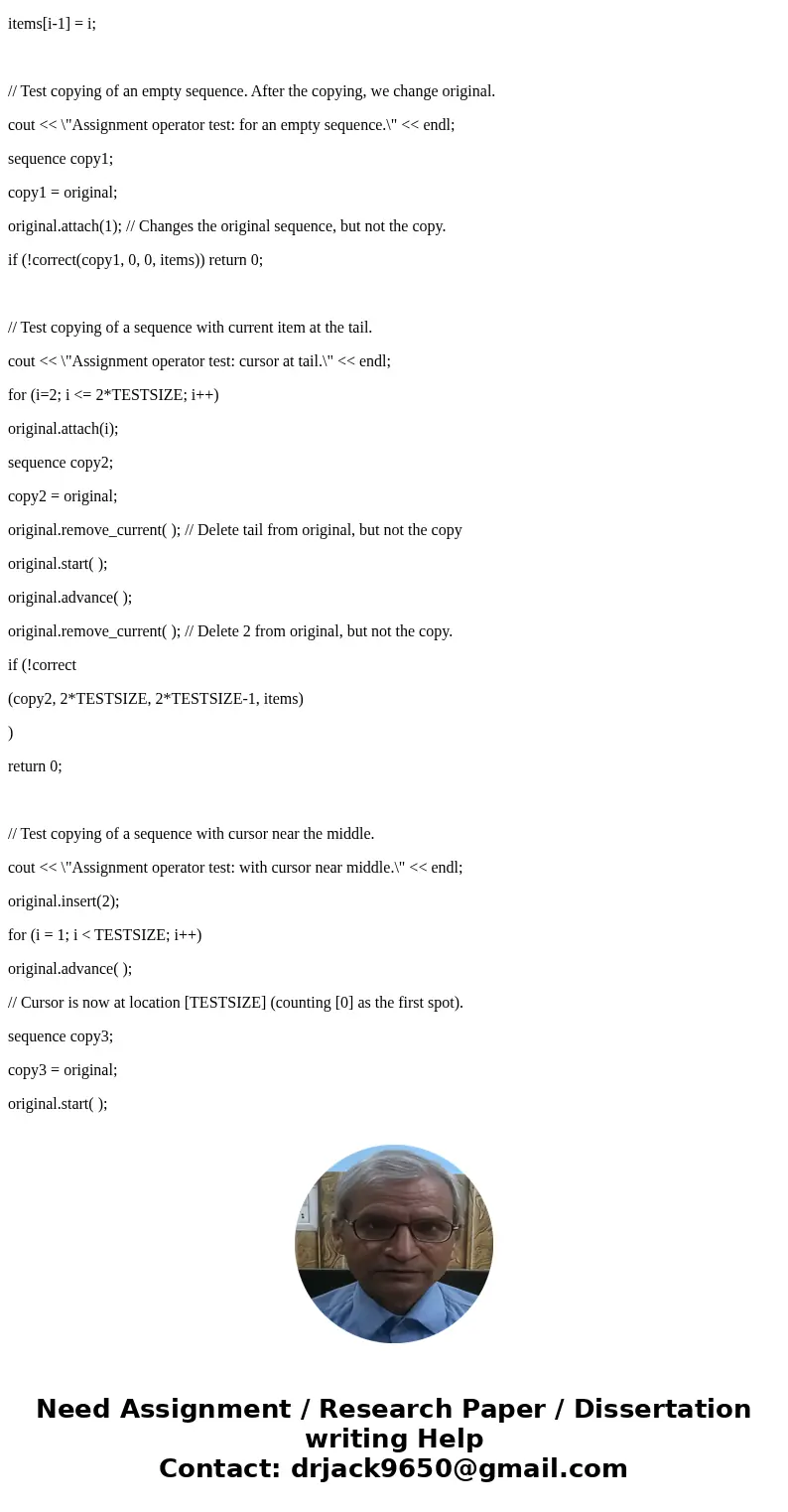
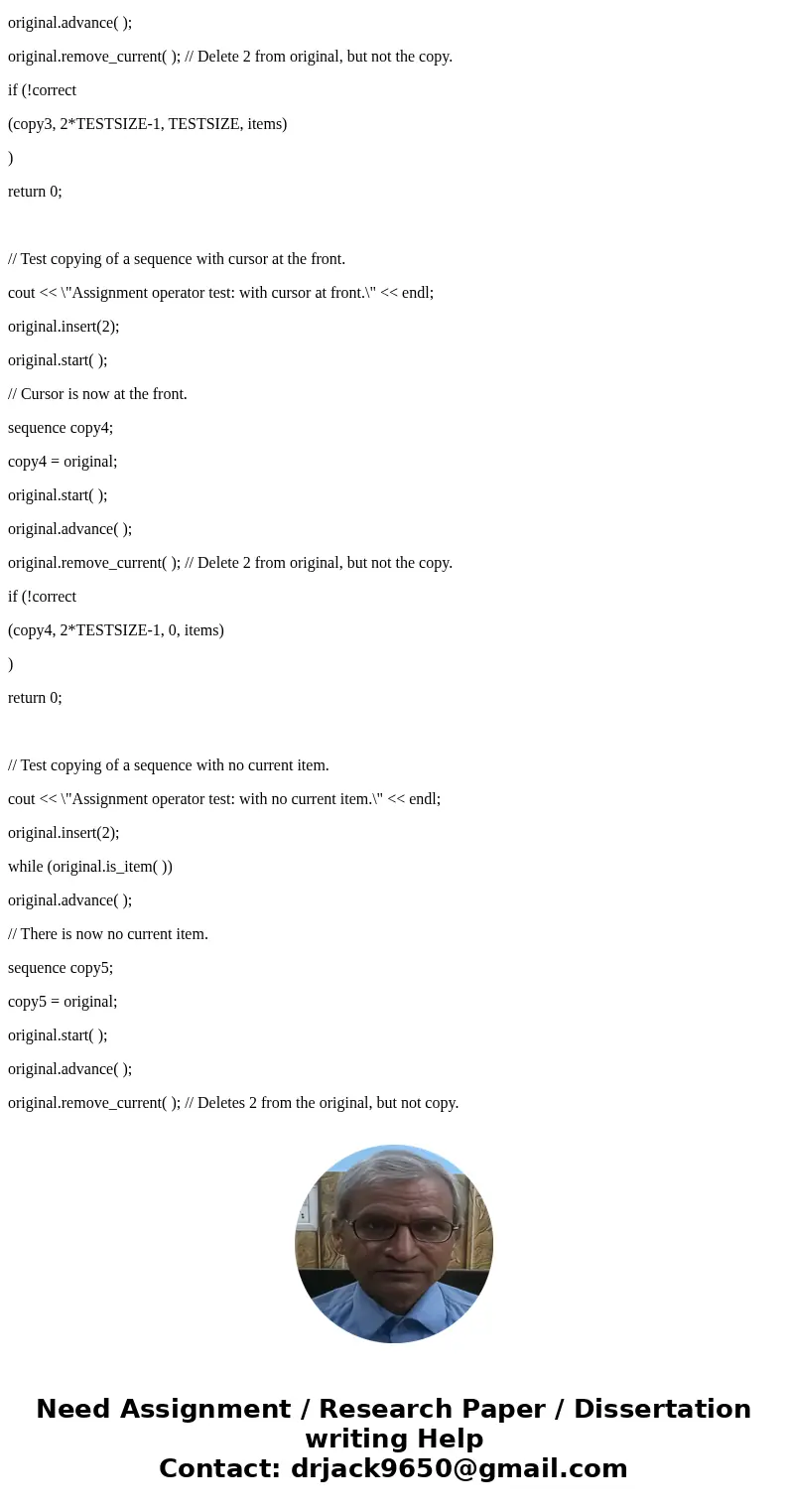
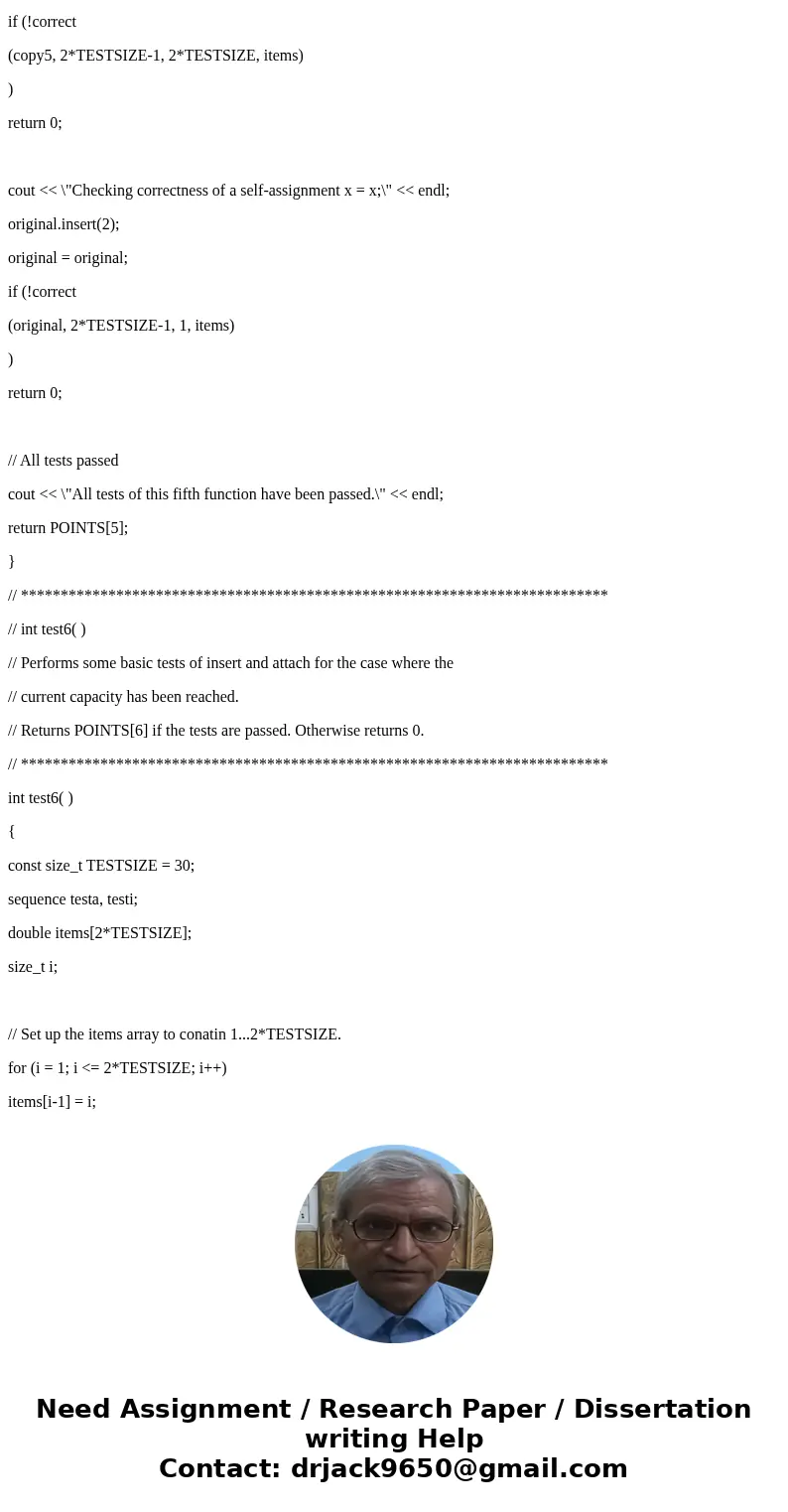
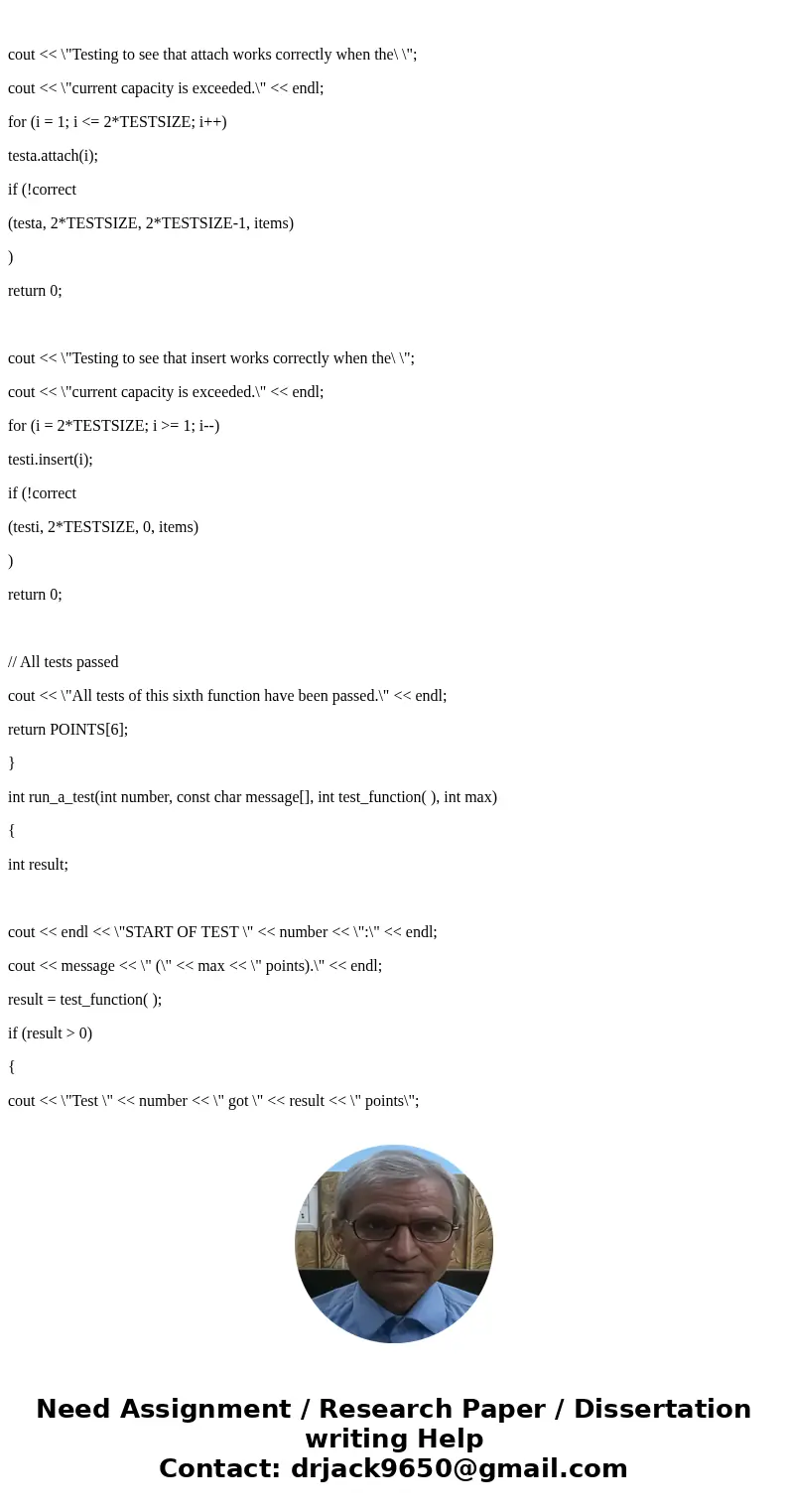
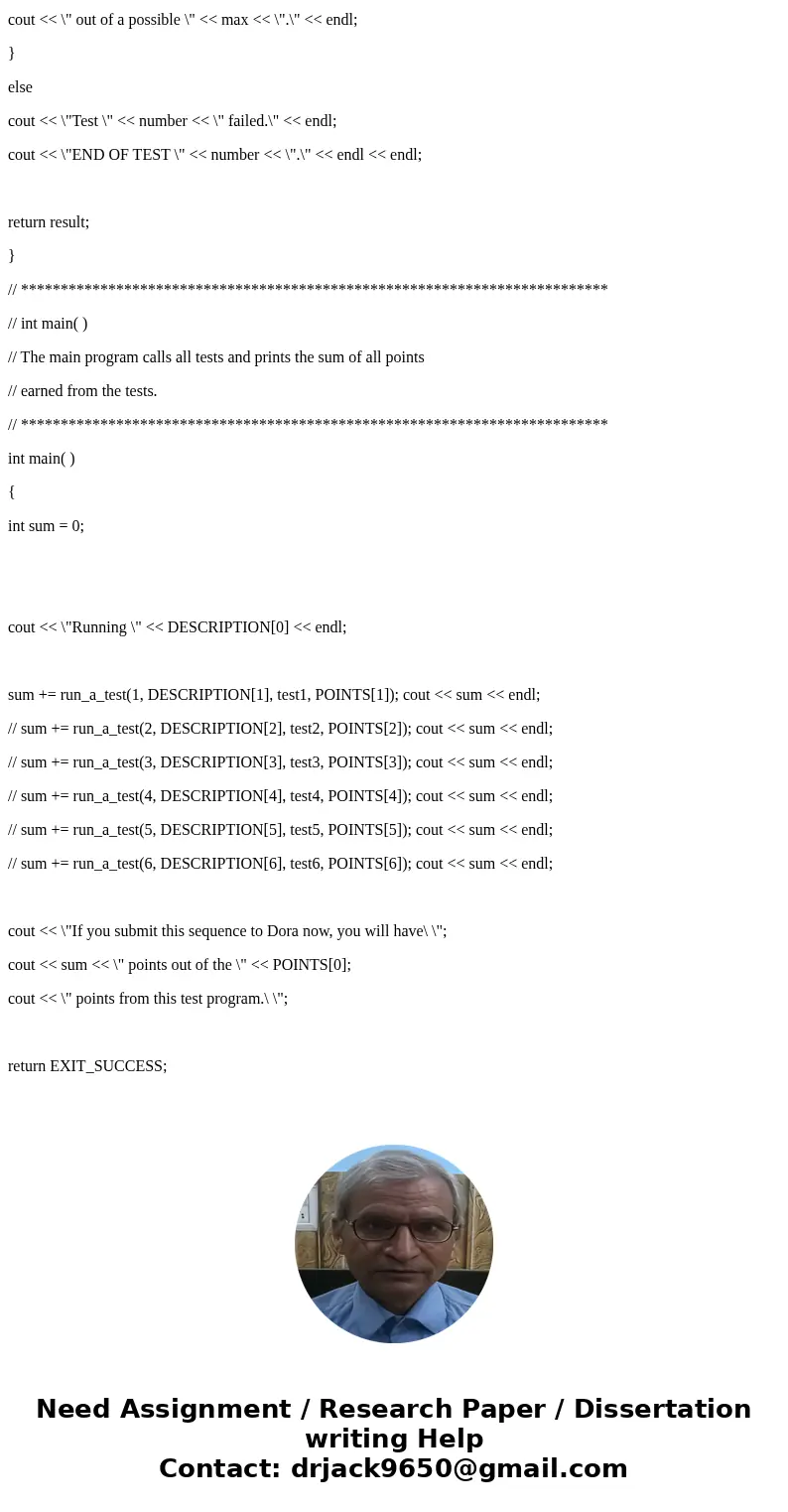
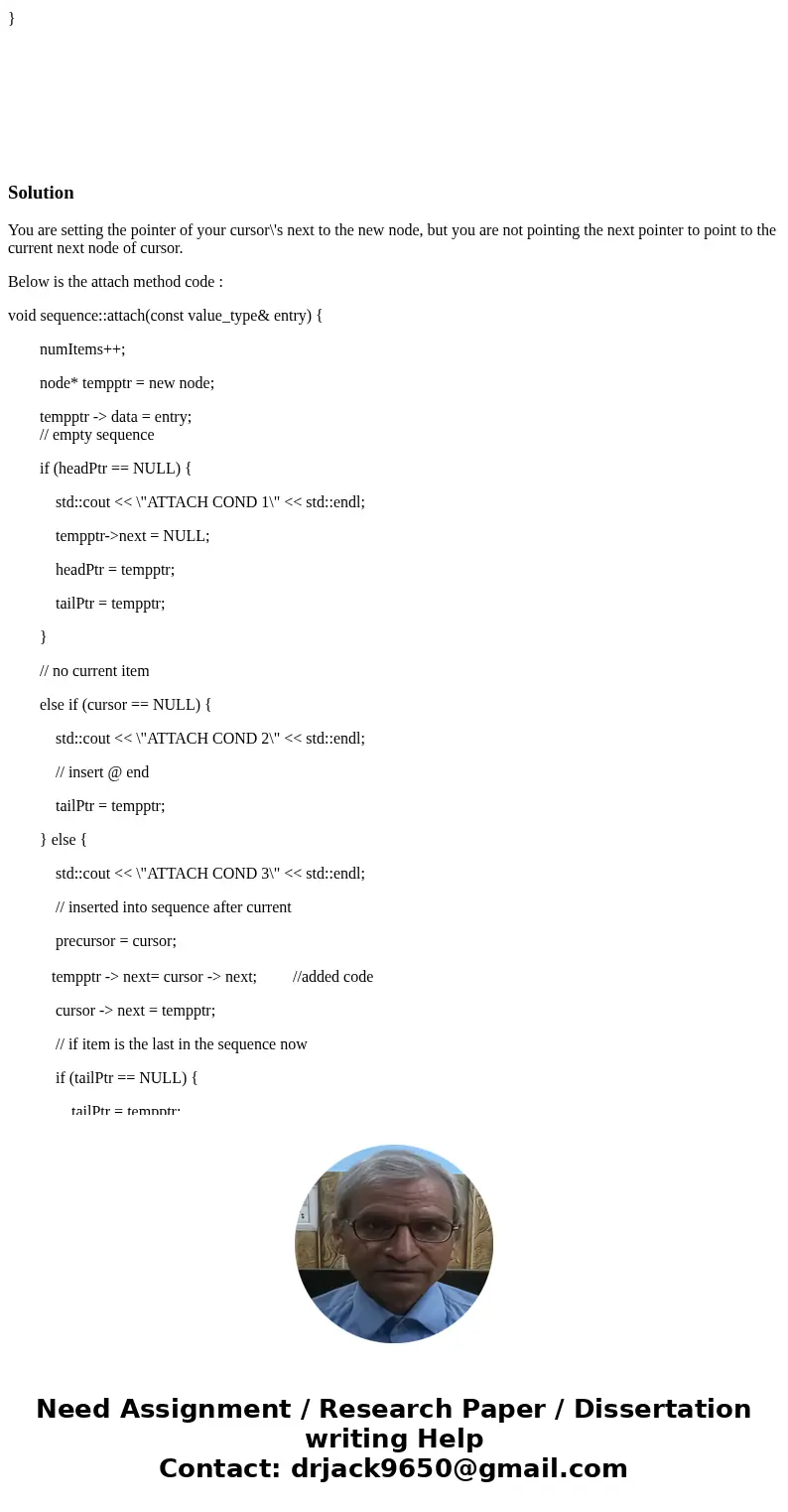
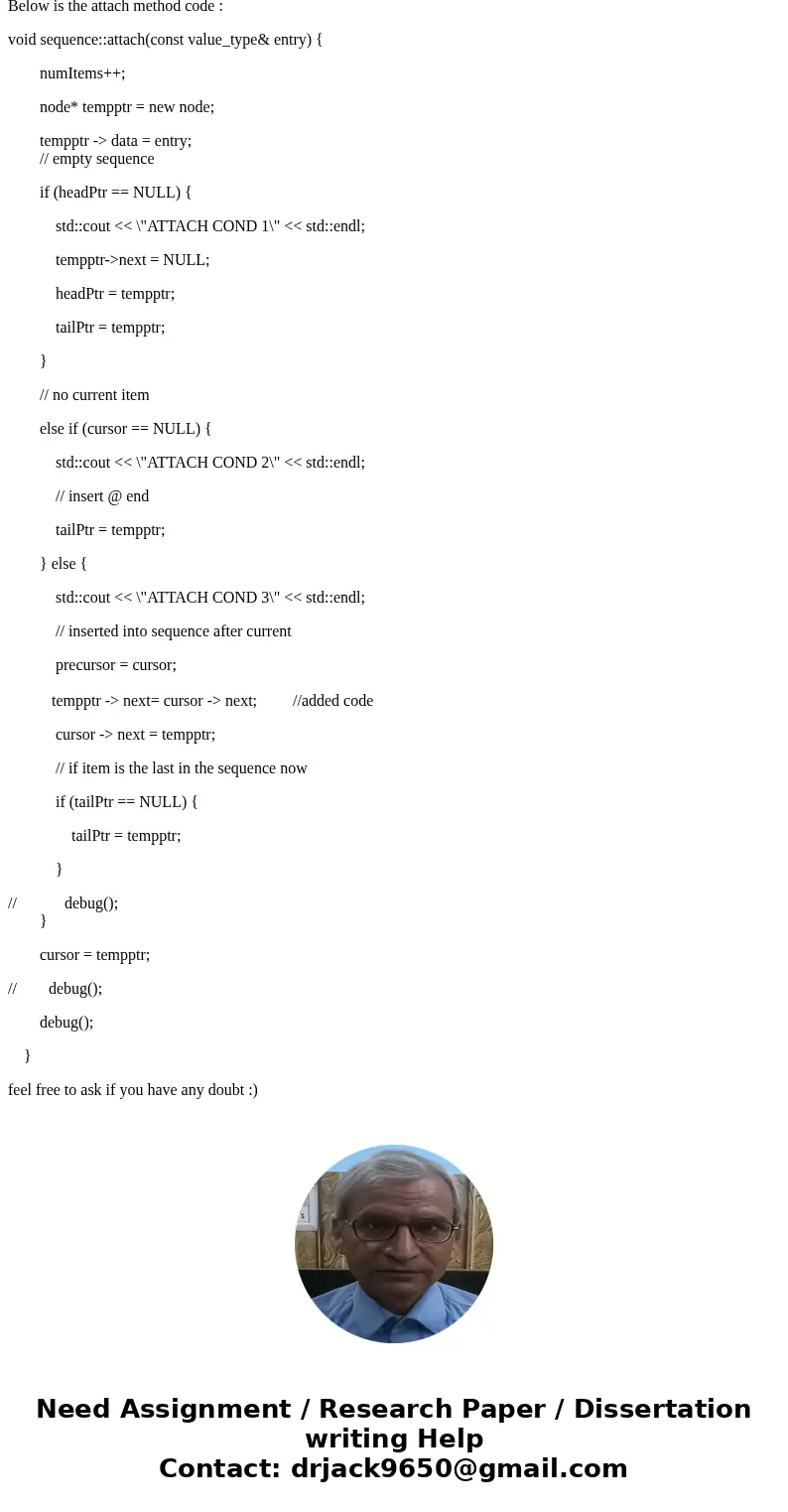
 Homework Sourse
Homework Sourse